Having a rental car in Iceland will give you the freedom you need to explore the country fully on an epic road trip. In this guide, we’ll answer all your questions about Iceland car rentals like how much they cost, and what type of car rental insurance you should get. Filled with money-saving tips & safety advice, this will help ensure you have a safe and fun-filled Iceland road trip!
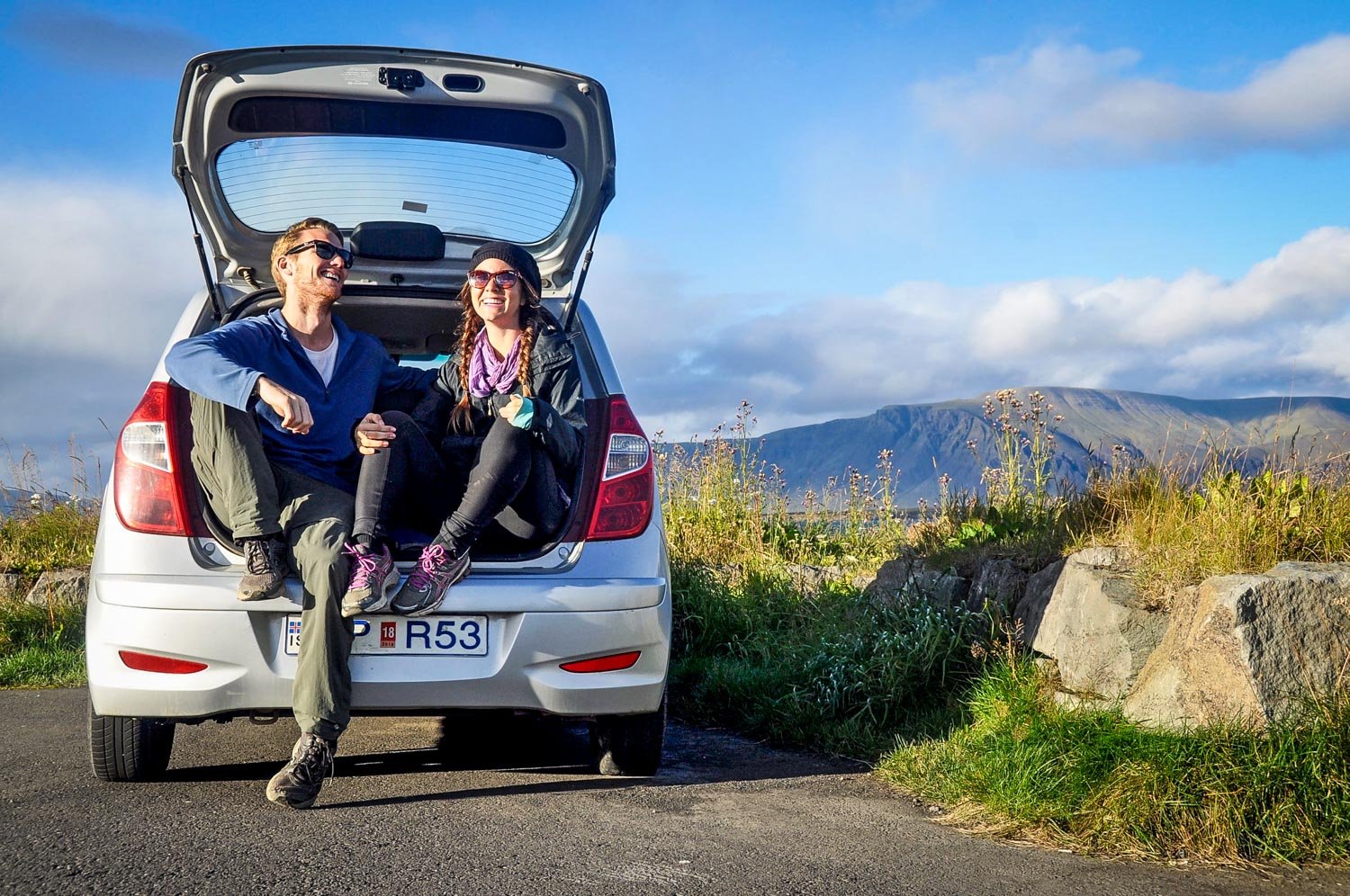
With wide-open roads and epic viewpoints around every corner, renting a car in Iceland is the ultimate way to explore this island nation. Download a sweet audiobook, pack your favorite snacks, and get ready for a road trip of a lifetime!
Actually, hold up! We’re getting ahead of ourselves…
There are some important things – really important things, actually – that you need to know before you hire a car in Iceland. Things that could cost you thousands of dollars if you’re not aware.
We’ve rented two different cars in Iceland as well as a campervan, and we can tell you this: Renting a car in Iceland is different than many other countries. And even if you’re a pro at car rentals you might be surprised by a few things.
Don’t worry; we’re about to go over everything you need to know about car hire in Iceland so you’re super prepared and have an unforgettable road trip!
Iceland Rental Car Guide
We’ve including some more info on renting a car in Iceland. Jump to the following sections, or just keep scrolling to see it all!
- Why rent a car in Iceland
- Tips for driving in Iceland
- Know before you rent
- How to choose your Iceland Rental Car
- Iceland rental car FAQs
- Car insurance in Iceland
- Car insurance FAQs
- Campervan rental vs. Car rental
- Perfect Iceland itinerary
Quick answer:
We use Booking.com (formerly RentalCars.com) to compare prices of rental car companies all over Iceland find the best deal that works for what we need within our budget.
Is a campervan rental more your jam? We’ve partnered with Happy Campers in the past and they were great to work with! We would highly recommend them if you’re into traveling Iceland by campervan.
Why should I rent a car in Iceland?
Before we delve into the nitty gritty, let’s go over why you should get an Iceland rental car in the first place…
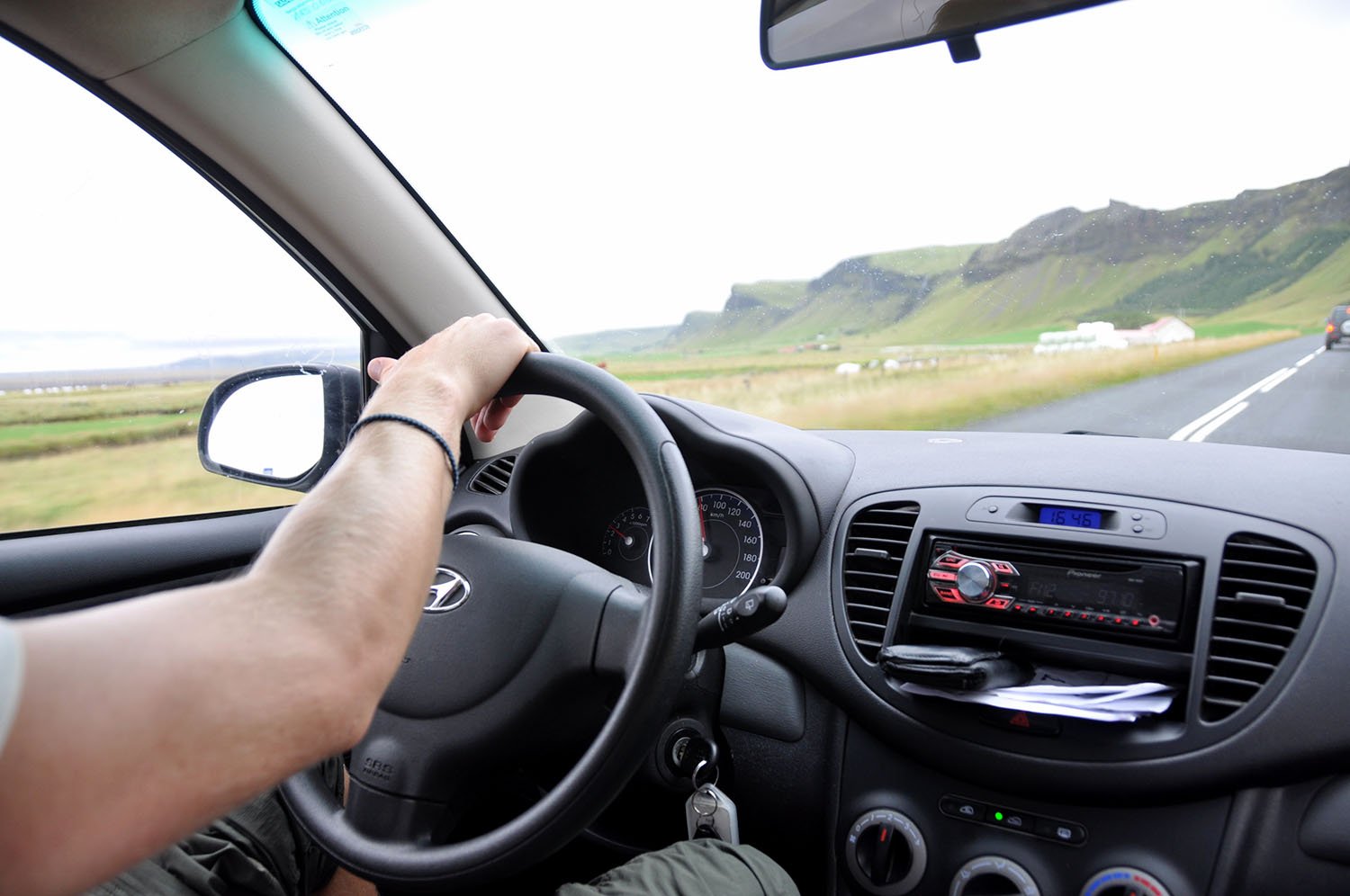
Whether you hire a car or rent a campervan, being behind the wheel gives you a sense of freedom you wouldn’t have otherwise. Many of Iceland’s most scenic spots are far from any town, and you simply won’t be able to get to them without your own mode of transportation.
Plus, with few public transportation options outside the city limits of Reykjavík, your best alternatives would be a bus tour, where you have no control over the schedule, or hitchhiking, which gives you basically no control of your travels. (Though if you’re up for it, hitchhiking through Iceland could be quite the adventure!)
Sitting in the drivers seat, or having a partner who’s driving (cough, cough, Ben!), gives you the freedom to discover hidden waterfalls, remote black sand beaches, and hot springs that only the locals know about.
Alright, are you convinced? Let’s get started planning the road trip of your dreams!
Psst! If you’re thinking of sticking around town for a few days, we’ve got plenty of suggestions for fun things to do in Reykjavík as well!
14 Essential tips for driving in Iceland
Driving in Iceland might be different from what you’re used to. We’re going over all the important stuff, from things you need to know about gas stations in Iceland, to navigating the single-lane bridges.
1. Understand gas stations in Iceland
Let’s talk about GAS, baby!
It’s not the sexiest subject to talk about, but it’s an important one.
a) Gas is expensive.
I mean, it has to be shipped into this island country, so I can understand why. Like anywhere in the world, gas prices fluctuate and tend to peak in the summer months.
During our most recent trip to Iceland (August 2021) the price of gas in Iceland was 225.8 ISK per liter ($1.75 USD). That works out to be just shy of $7 USD per gallon. Ouch! Be sure to take the high gas prices into account when planning your trip.
Psst! Check out these tips for saving money on gas in Iceland.
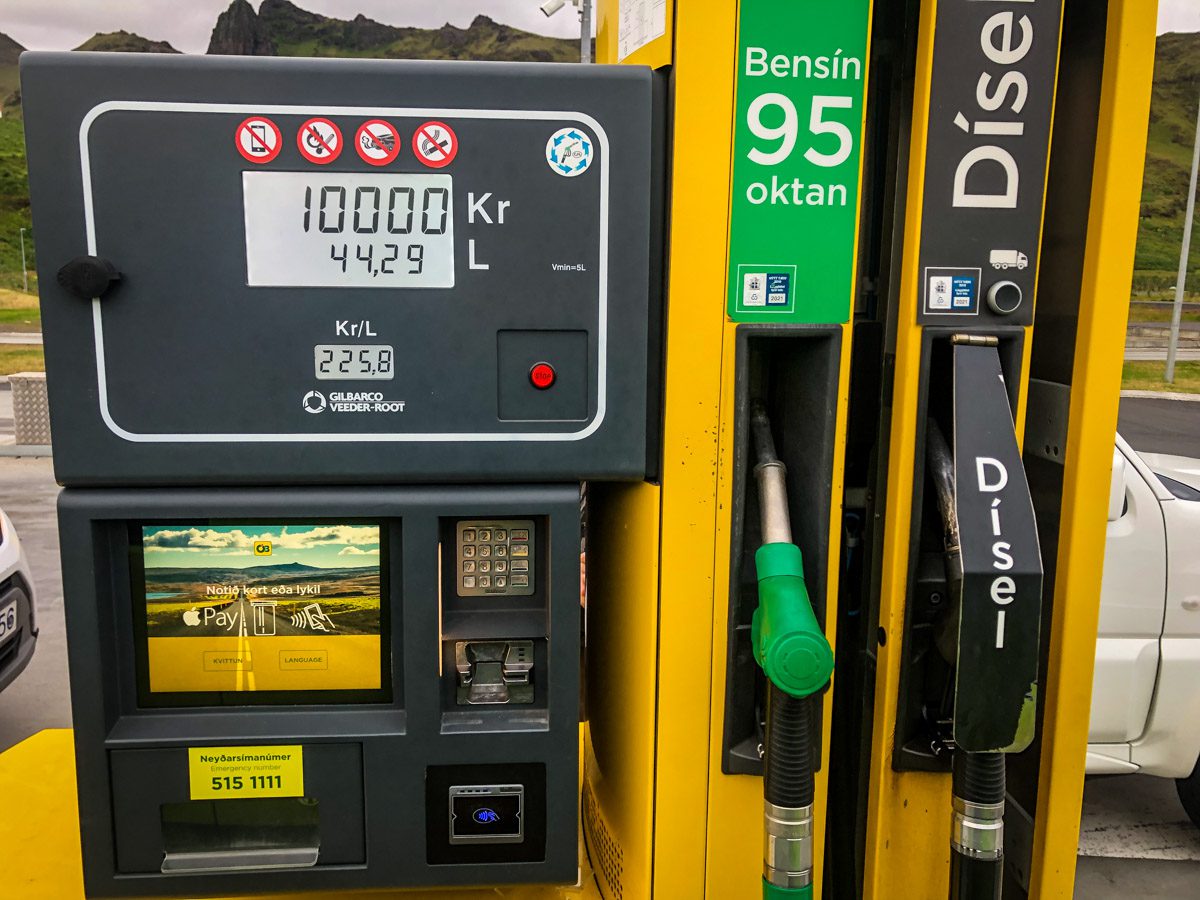
b) Gas stations are generally open 24 hours a day.
However, there’s a but… The building itself will be closed at night, usually around 8 p.m. (some are open as late as 10 or 11 p.m.). You can still fill up at the pump using a card. But read the next point, because it can be a biggie…
c) Know your PIN number.
At some gas stations in Iceland, you’ll be asked to type in your pin at the pump, though this is becoming less common. (We noticed this was more common at gas stations outside of Reykjavik and at those without attendants.) If you’re using a credit card that doesn’t have a pin when it’s required, it will be declined. If this happens, you can simply walk inside and hand your credit card to an employee (if there is one on duty) who can authenticate it for you.
However, if you’re trying to fill up at night or early in the morning, you’ll be outta luck. We’d recommend bringing a back up debit card (with a pin) for this purpose. We’ve also heard that Apple Pay works at some gas pumps in the country, though we didn’t personally notice this.
Related Reading: The Best Time to Visit Iceland: When to Go & When to Avoid
2. Don’t let your tank get empty
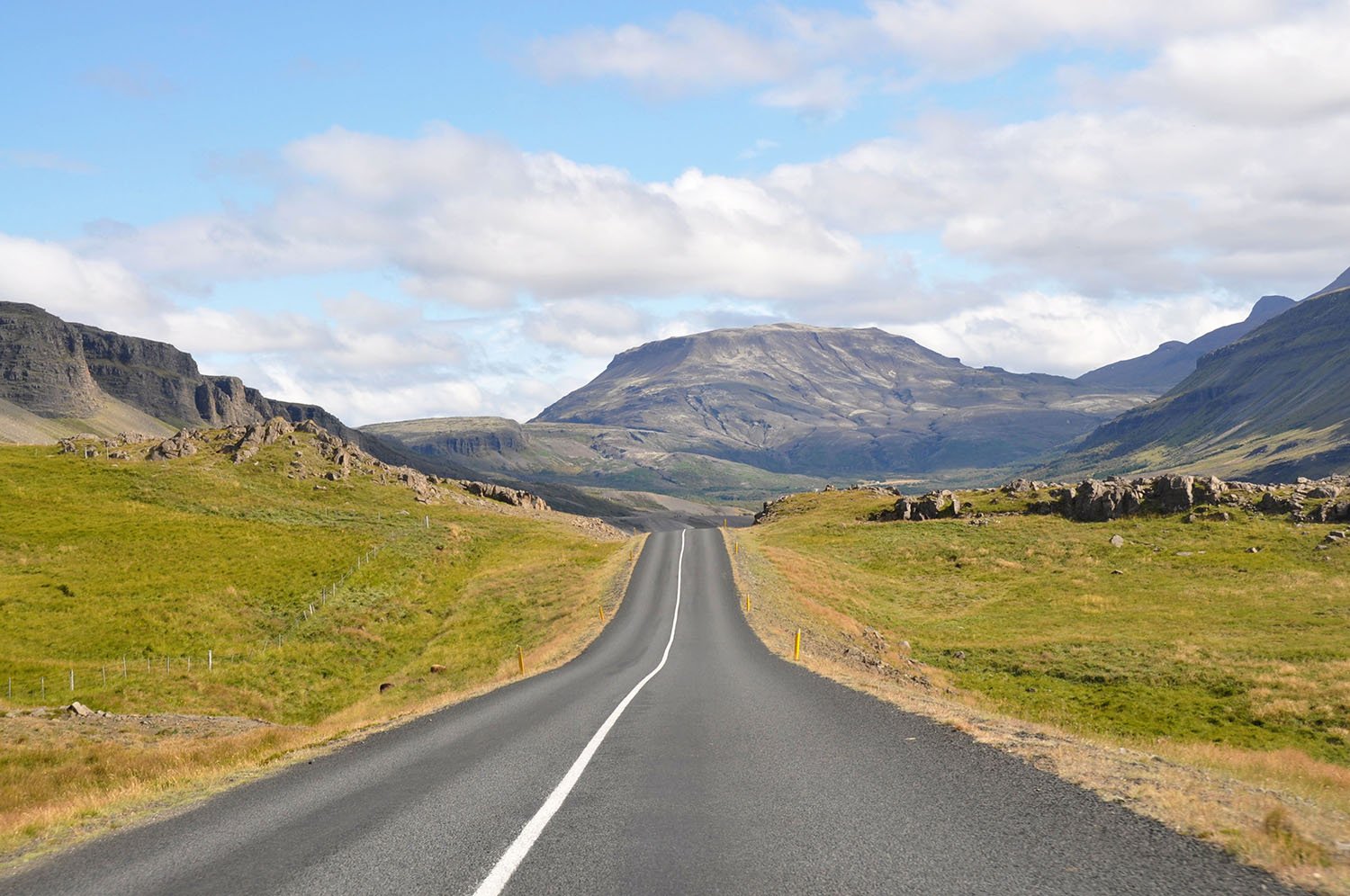
While we’re on the subject of fillin’ yer tank, let me indulge with an anecdote…
When I was a teenager, I used to do this thing where I’d let my tank go past empty before filling up. Every single time. It drove my parents nuts. I had other things I’d rather spend money on, like clothes and makeup and food and movies and, well, just about anything besides gas.
Lesson: Don’t be like 16-year-old Katie. (For many reasons…)
In Iceland, there are many stretches of road (once you get outside Reykjavik and Ring Road) where you won’t see another soul. This is usually a good thing, and likely part of the reason you’re visiting Iceland. However, if your gas tank is nearing empty, it can be a nerve-wracking ride until you find a petrol station.
So you’re driving along with a tank that’s half full when you pass by a gas station. What do you do?! Flip a U-turn and go fill up! Don’t risk it.
3. Watch your speed
This is an important one. (Be sure you read it!)
While driving in Iceland, be sure to be extra cautious about your speed. For safety reasons, obviously, but also because there are speed traps set up around the country (mostly around Reykjavik) just waiting to catch drivers over the limit and give them hefty fines.
More often than not, it won’t be a police officer flashing their lights that’ll let you know you’re in trouble. Instead, it will be cameras that detect your speed and flag you. If you’re not paying attention, you might never even notice them.
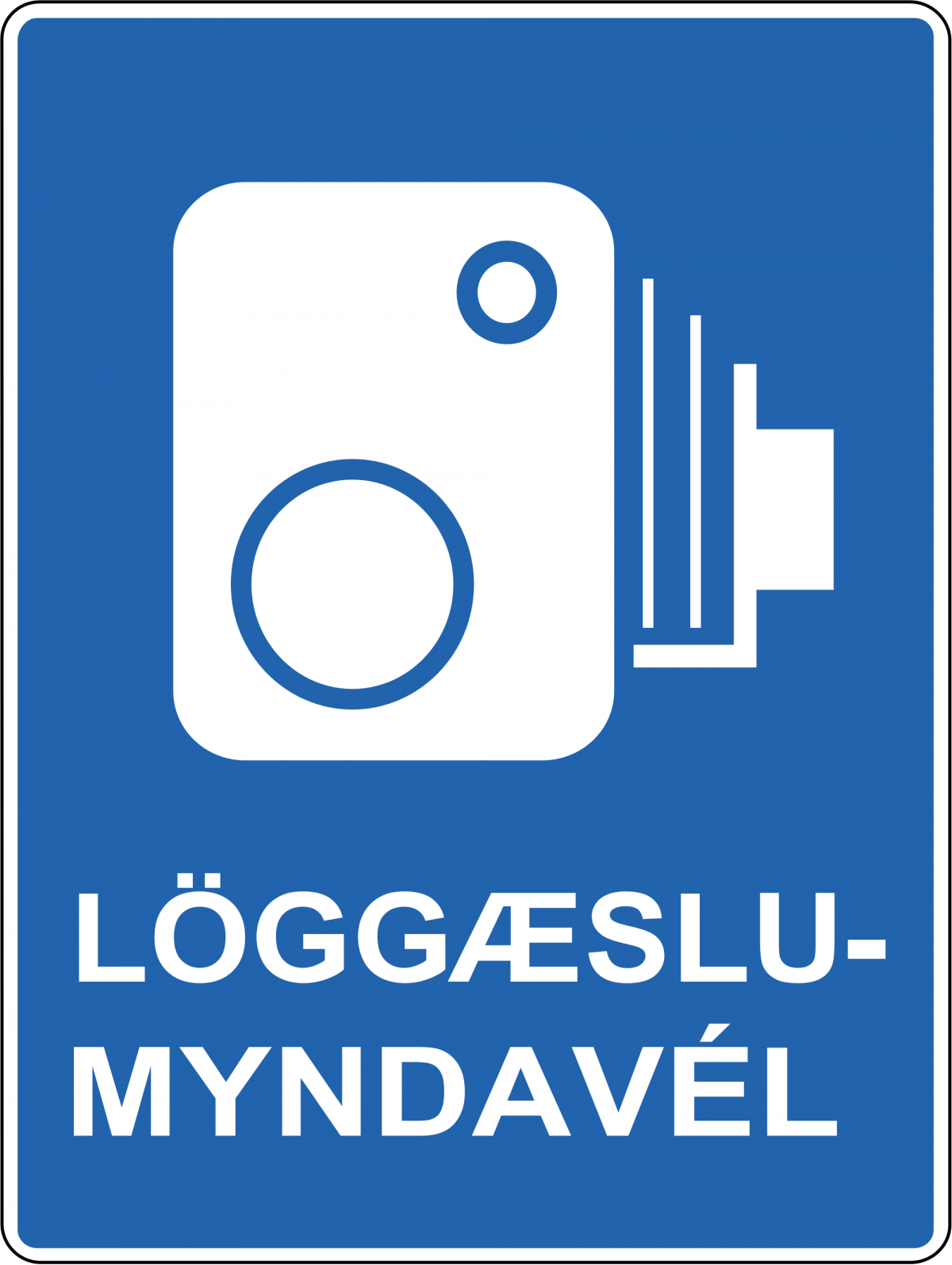
No, this does not mean you’re approaching a photogenic landscape! It means you are about to pass a speed camera. Don’t slow down and you’ll get a ticket!
How to spot the speed cameras: Before every camera, there is a blue sign to warn motorists (pictured).
The sign is in Icelandic, so take a good look at it and memorize it so you know when you see one!
It’s also good to know that all tunnels in Iceland have at least one speed camera (if not more!), so be sure you follow the 70-kilometer speed limit in tunnels.
Speed limits in Iceland
The highest speed limit you’ll find is 90 kilometers per hour on highways. That’s about 56 miles per hour, folks. It’s going to feel kind of slow if you’re used to highways in the United States, like we are.
Always look for signs with the speed limit posted, but here are some general rules of thumb to keep in mind:
- 90 km per hour on highways (Nowhere in Iceland are you allowed to drive faster than this.)
- 80 km per hour on gravel roads
- 70 km per hour in tunnels
Speeding fines are high (like really high!)
Find out just how expensive the speeding fees are on this website (They’re pricy, like $670 USD for going 13 mph over). It will give you an idea of what to expect for fines depending on the speed limit and how much faster you’re driving. Spoiler Alert: The fine increases exponentially the higher above the limit you’re going!
Note: The site linked above is in Icelandic, but you can select the option to translate the page.
What if you get a speeding ticket?
If you’re pulled over by a cop, you may be expected to pay your fine on the spot using a credit or debit card. We’ve read that some police officers will also give you the option of mailing in the payment later (though the fine will be higher).
If a camera catches you speeding, you’ll receive a ticket by mail. Rental car companies are required by law to disclose your information to police. It might take a few weeks before you receive the bad news.
The Internet is full of forums and threads from people who returned from a lovely vacation in Iceland, only to find out they owe more than $1,000 USD in speeding tickets a month later.
While information varies a bit, it seems that there is a “discount” offered for those who pay their fine by a certain date. It also seems that some people brag about not ever paying their fine. We’re not going to debate the unethical nature of this, so instead we’ll just leave you with our advice…
Don’t Speed, Damnit.
Put on that sweet, sweet cruise control (fingers crossed your vehicle has this function!) and respect the speed limits.
Sure, you might see locals speeding, but they tend to know where the speed traps are and can slow down in time. They also have a better understanding on how to handle the Icelandic roads, which might be quite different from what you’re used to.
Plan your trip with enough time so you don’t have to speed. Simple as that!
Oh, and while we nearing the point of sounding like your mother, please wear your seatbelt too, it’s the law in Iceland!
4. Be prepared for sudden changes in weather
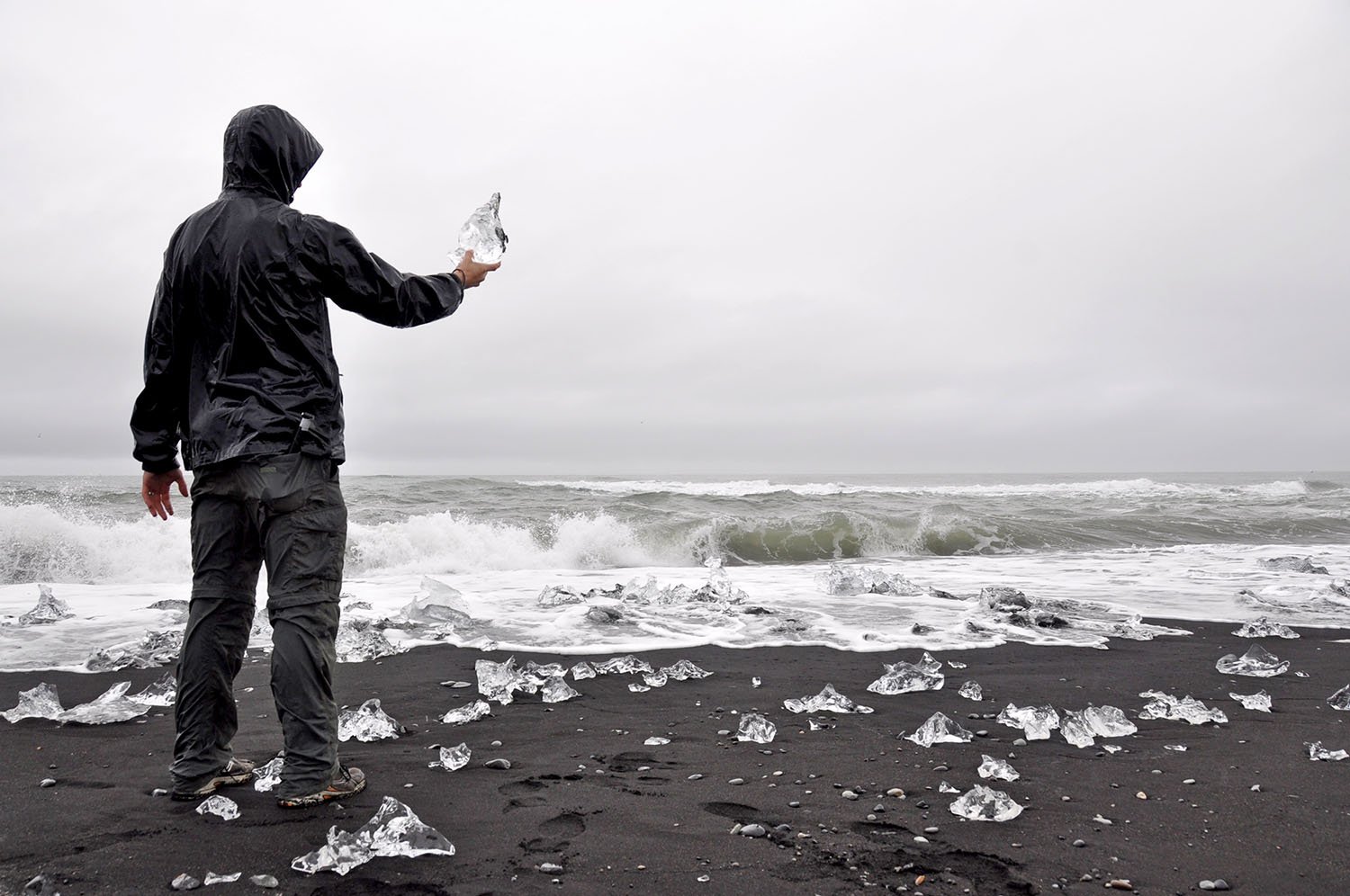
The weather in Iceland is notoriously fickle. Sunshine in the morning, wind by noon, rain storm in the evening, and snow at night.
There’s a joke amongst Icelanders that says “if you don’t like the weather, wait 5 minutes.”
If you’ve got a long drive ahead of you, there’s a good chance you’ll experience different weather patterns. Keep up to date with the forecast by checking before your drive. This website breaks down road and weather conditions by region, which is helpful. We also found the Vedur app to be pretty accurate when it comes to current weather conditions.
Want more tips? We’ve got a round-up of more apps to download before your trip to Iceland.
And be prepared for winds. Strong winds. On those open roads with no trees to shield your car, they can seem brutal. On that note, be very careful when you open your car door in high winds, as it can catch!
5. Exercise caution in high winds
Being that Iceland is an island situated in the North Atlantic, it should come as no surprise that the winds here can get strong. Very strong. Add to this the fact that there is little vegetation or tree coverage to shield the roads.
- Be careful driving: When the winds pick up, you’ll know it. It can be a bit of an added challenge when you’re driving, so be extra careful.
- Watch out for sand and ash: Also, if you notice sand or ash being picked up in the winds, you may want to reconsider where you’re driving as this combination can strip paint off your vehicle. This is rare, but common enough that there is a specific insurance for sand and ash damage (it’s not covered under “normal” protections).
- Hold the door: When you get out of your vehicle in high winds, be super careful with your door. We’ve personally experienced them flinging out of our grip because the wind was so strong. Thankfully, there wasn’t anything around when this happened, but if you’re parked next to another vehicle or at a gas pump, you could acquire some major damage. We’ve even heard stories of people having their doors ripped off of their car in high winds (yeah, seriously). You’ve been warned!
Insider Tip: Before heading out for a day of driving, check the Vedur website or app to see what the predicted wind speed is.
6. Know the protocol at single-lane bridges
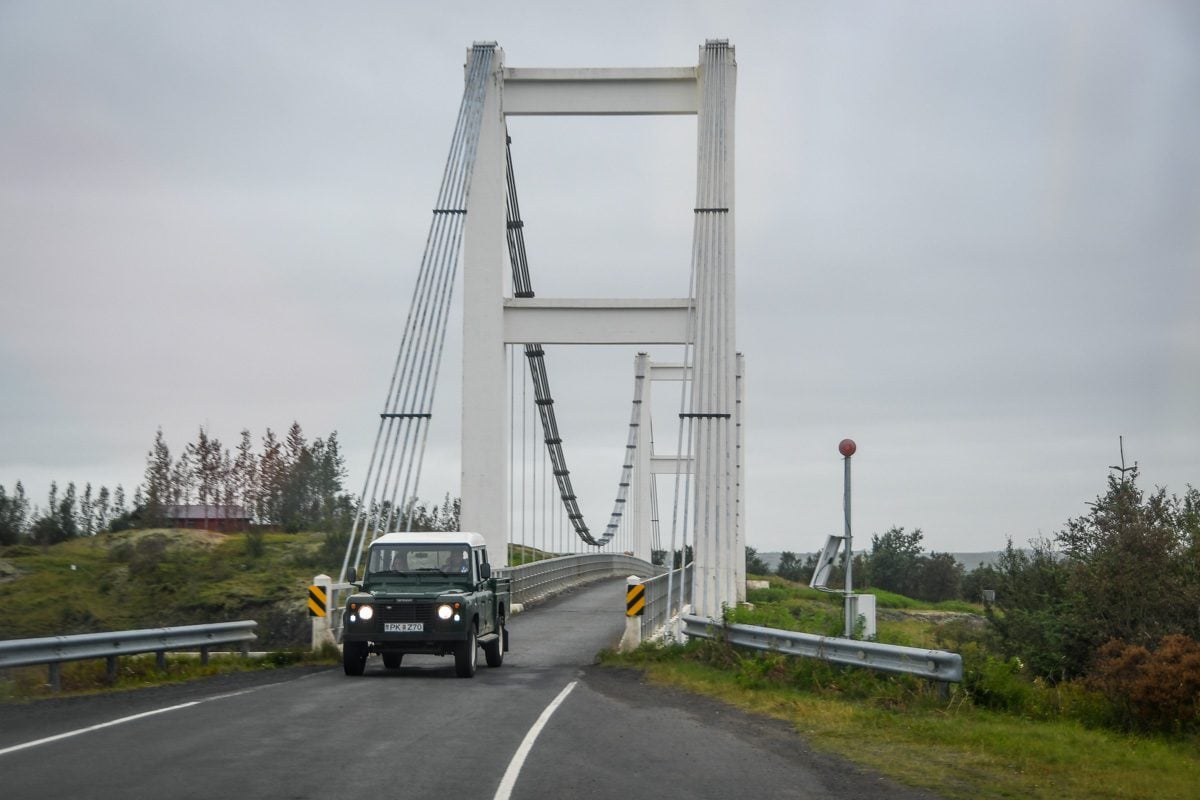
Highway 1 (aka the Ring Road) has quite a few single-lane bridges, and there’s a good chance you might wind up at one at the same time as another car.
The general rule to follow is the car that’s closest to the bridge will have the right of way while the other waits for them to cross. However, it’s a good idea to slow down just in case that other driver isn’t as prepared as you (and hasn’t read this article!).
7. Watch out for sheep!
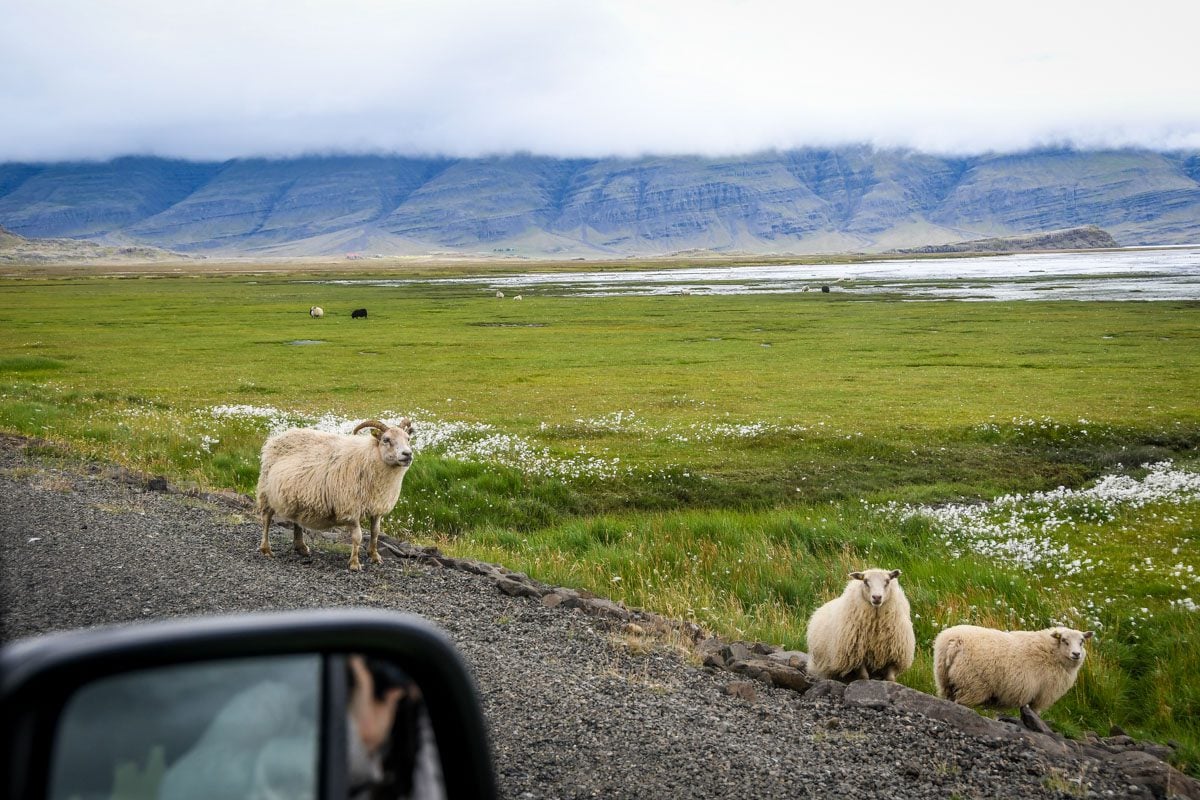
Why did the sheep cross the road?
Because she COULD, damnit.
In the Icelandic countryside, many livestock roam freely, uninhibited by fences. Sheep, cattle, horses, you name it.
Yes, this is a real thing you need to look out for when driving in Iceland. In fact, in some regions of Iceland, there are reports that 2 to 3 sheep or lambs are struck in day. Don’t be that person. Watch the road, especially when you are driving through an area where you see livestock roaming.
8. Get ready to drive on unpaved roads
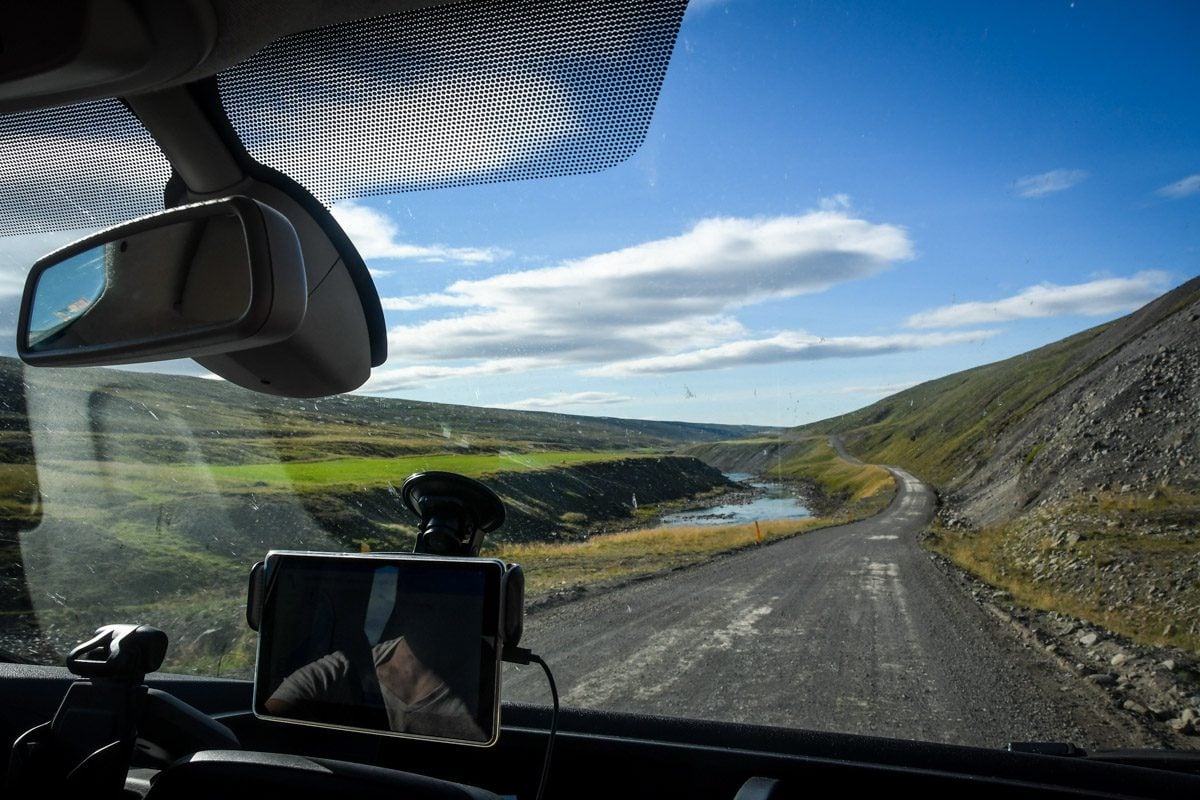
Iceland has more than 8,000 miles of roads, fewer than 3,000 miles of which are paved. That means you will most definitely be driving on some unsealed roads during your trip in Iceland.
For the most part this shouldn’t be too big of a deal. Simply observe the reduced speed limits on gravel roads (80 km / hour).
Good to know: One of the most common places for accidents in Iceland is when a paved road turns to gravel, as a car can easily skid out of control. Avoid this by reducing your speed as you approach the unpaved section.
Unpaved roads tend to be a bit more narrow than their paved sisters and brothers, so pay extra careful attention to oncoming traffic.
Also, avoid damage to your windshield by not getting too close to the car in front of you. This will prevent small rocks from flying up and creating one of those awful spider web cracks.
9. Know where you can (and can’t!) drive
If you’re renting a regular 2-wheel-drive vehicle, listen up… There are some roads you cannot drive on. And I’m not just saying you shouldn’t drive on them. You literally CAN’T because a) it’s illegal, and b) your car will not make it. Oh, and your insurance will not cover anything that happens on these roads, since you are there illegally. Have I made my point? Good…
So how do you know which roads to avoid? Luckily, it’s easy. Just don’t go on any “F-roads”.
What the eff are “F-Roads”?!
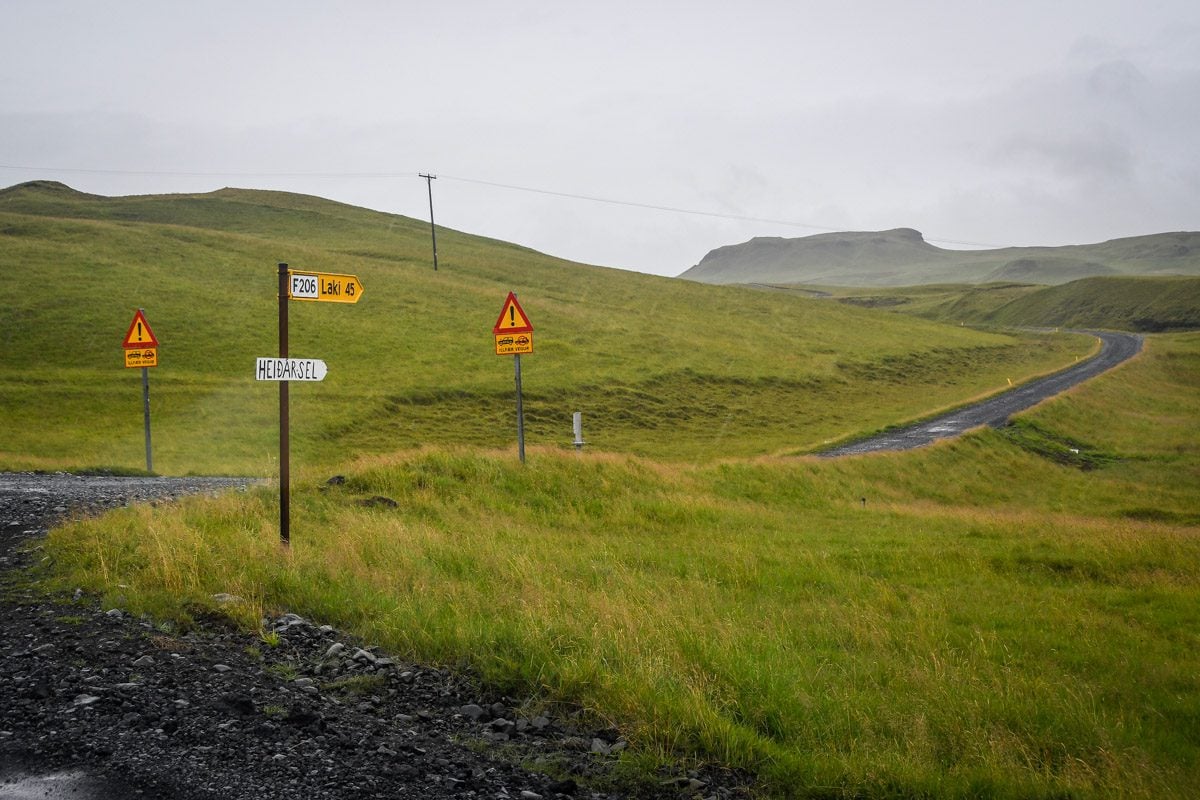
These are akin to “fire roads” in the United States, and they’re really not maintained at all. These mountain roads bring you into the backcountry, and can lead to some epic adventures.
If you want to really get off the beaten path in Iceland, be sure to rent a 4×4 vehicle so you can legally (and safely!) drive on the F-roads! Oh, and read this guide on how to drive in the highlands.
It’s also worth noting that F-Roads aren’t open all year long. These mountain roads are only open during the summer months, typically June/July – September (or after the first snow). Check the current conditions here.
10. Don’t EVER drive off the road
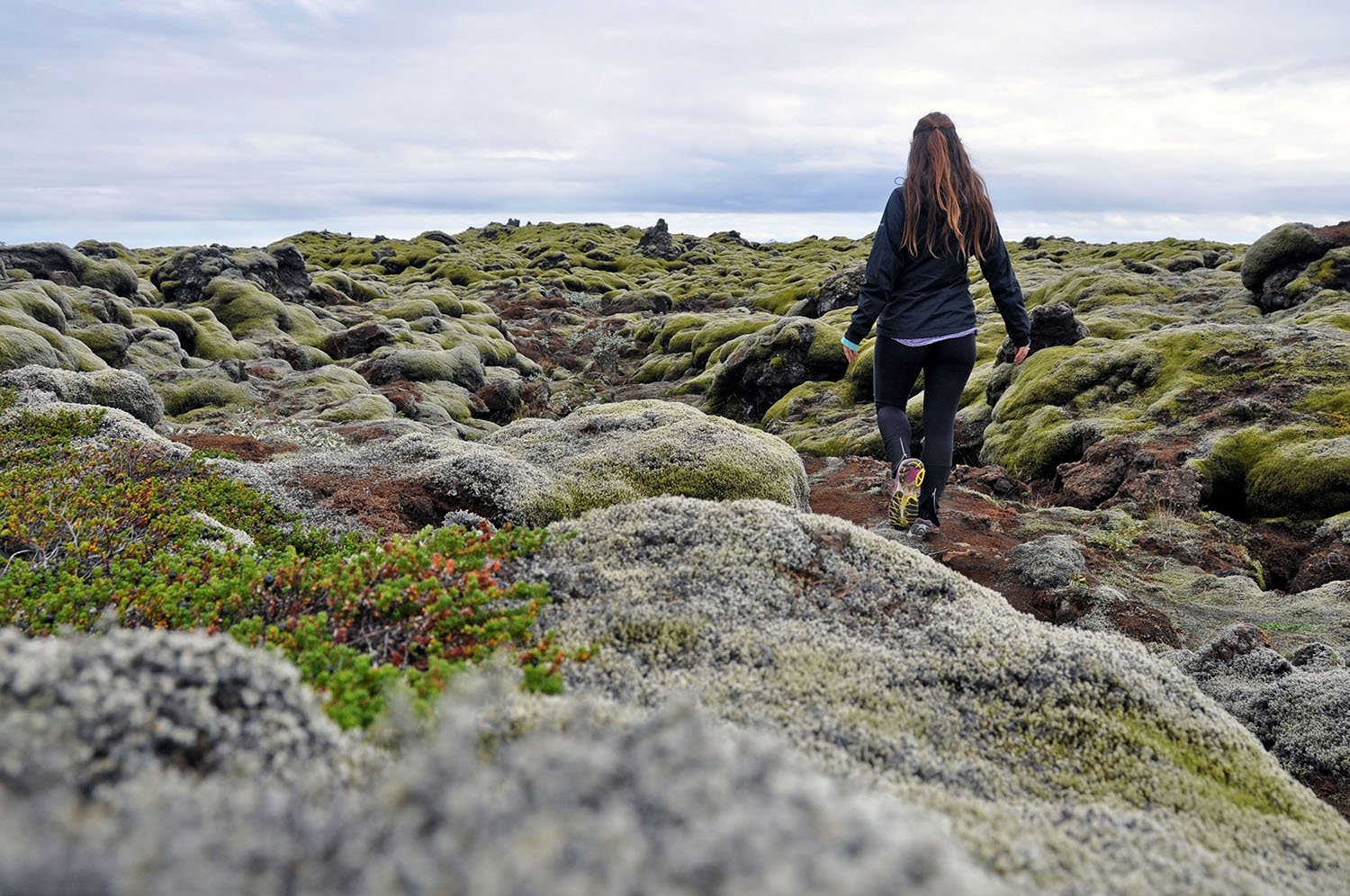
It is illegal to go “off roading” in Iceland. The ecosystem on this volcanic island is incredibly fragile, and your car’s tires will do damage that can take many, many years to heal.
Be a responsible traveler, and stick to the roads!
11. Understand what to do at roundabouts
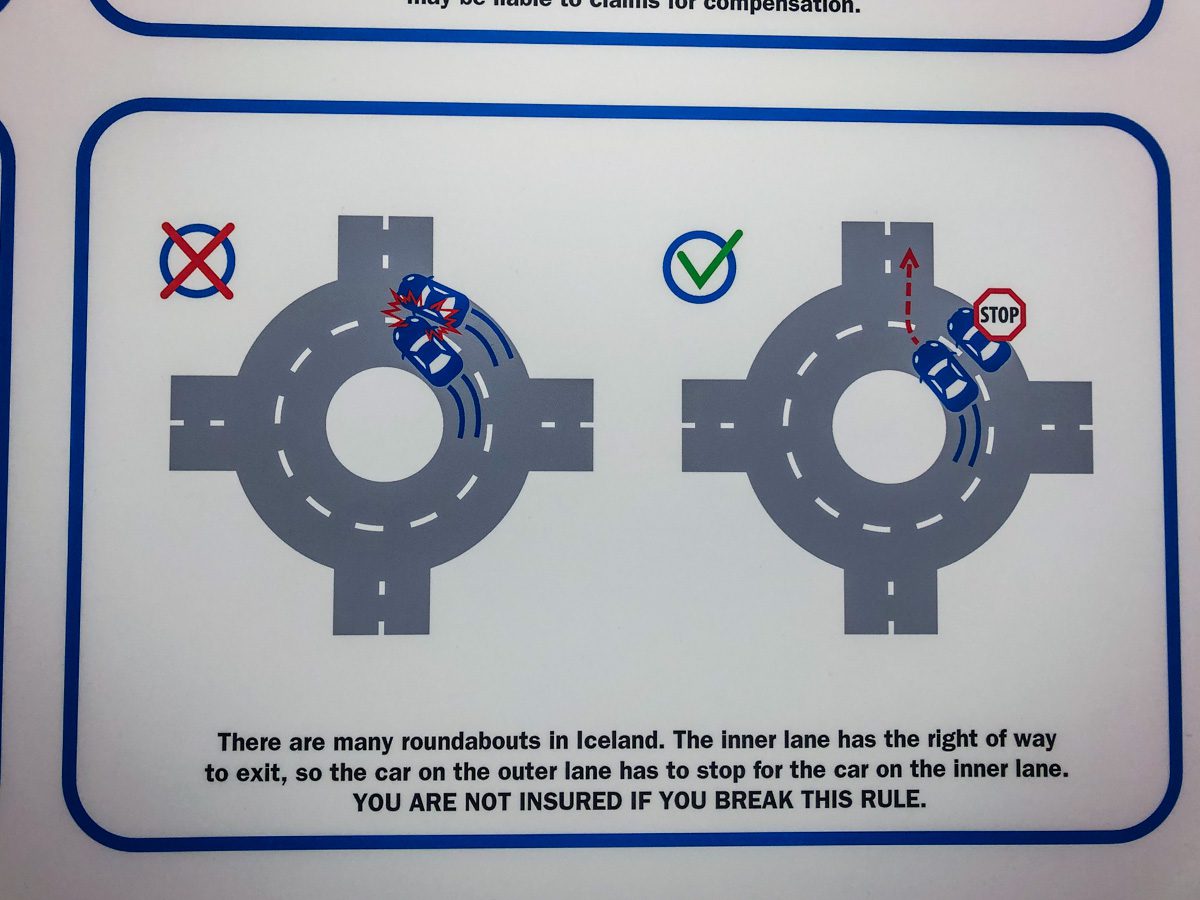
There are tons of roundabouts in Iceland – especially around Reykjavik. And they can be confusing to navigate, even if you’re used to roundabouts at home.
The biggest thing you have to know is that when you’re driving a 2-lane roundabout, the inner lane has the right of way. That means if you are in the outer lane, you must yield to the inside driver at each exit. If you don’t follow this rule and there is an accident, insurance won’t cover you.
12. Don’t stop in the middle of the road to take pictures
You might see other people doing this, but please don’t follow their lead. It’s actually illegal to stop on the roadside, as it can be hard for others to see your car. Park in designated spots, then walk to your photo spot.
13. Headlights must be on at all times
Make sure you always turn them on if your vehicle does not have the auto function. This is for your own safety as well as other drivers as it can get quite foggy.
If you don’t have automatic lights, just make sure you turn them off every time you park your car. We accidentally left ours on and drained our battery and it was quite the adventure trying to find someone with jumper cables.
Next time we travel in Iceland, we may just bring this portable jumper set as it seemed like no rental cars came with them. (Yes, you can fly with it!)
14. Be prepared for winter driving
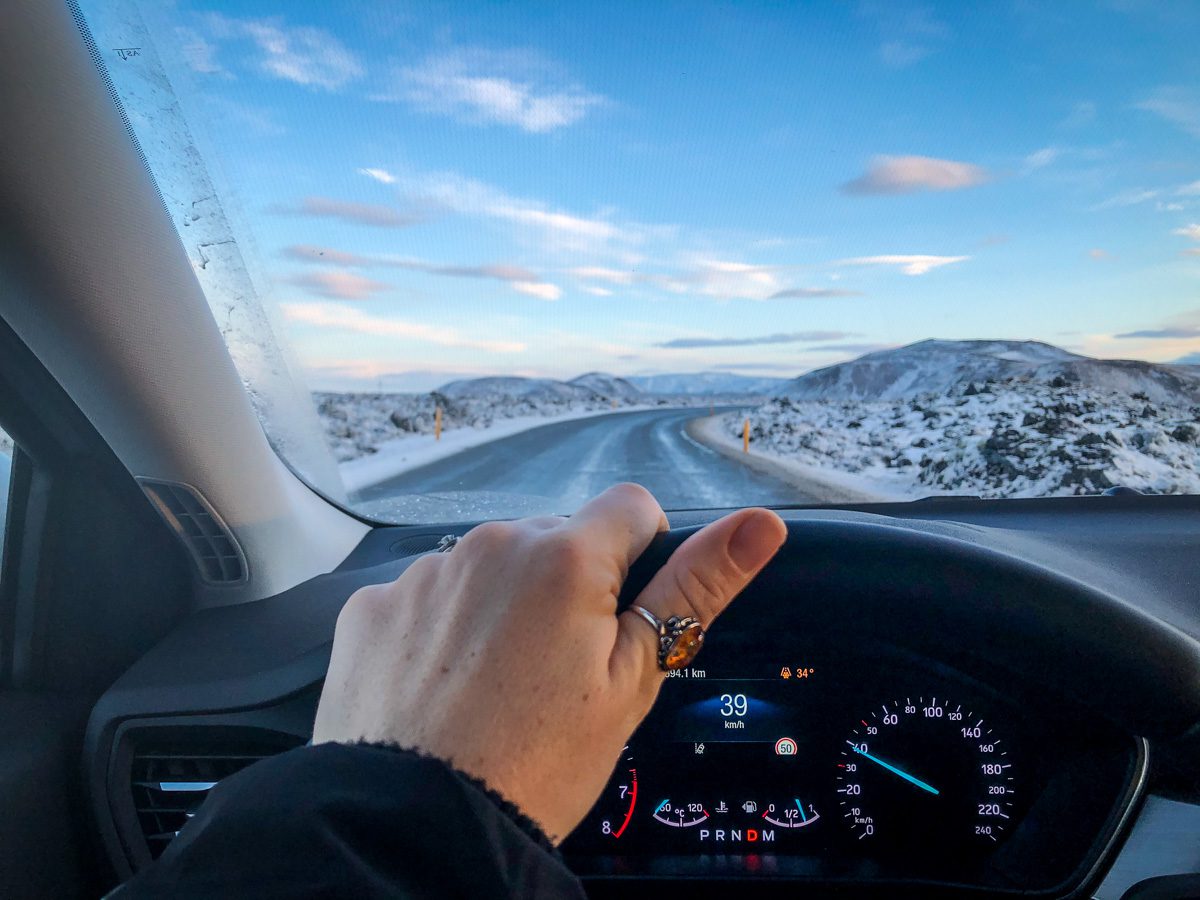
Studded snow tires should come standard with most rentals, but double check to make sure your vehicle is properly equipped. Having a 4×4 rental car can help you feel more confident and in control on icy roads (especially if you’re not used to driving in these conditions).
Some companies offer a “Winter Supply Kit” which typically consists of flashlights, jumper cables, shovel and other winter gear to keep you warm and safe in case of an accident.
Know before you rent
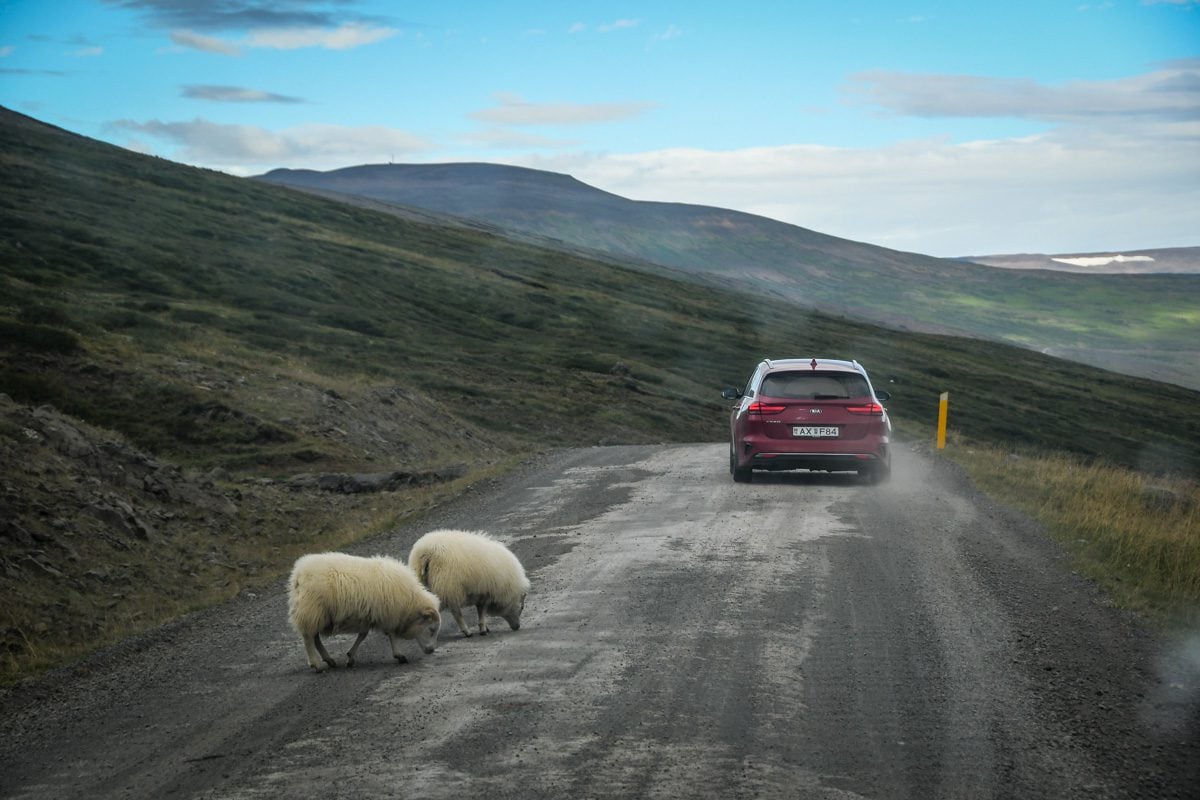
Now that we’ve gotten some important safety tips out of the way, let’s dive into how the choose the best rental car for your Iceland trip.
Which Iceland car rental company is the best?
It’s honestly overwhelming when you start to look at all the rental car companies in Iceland. There are a lot to choose from, and we always suggest looking around for the best rates, and also taking into account the service you’ll be getting in exchange.
We personally like using Booking.com (formerly RentalCars.com) wherever we are in the world because it allows us to compare the prices and offerings of many different rental providers. You can also use a bunch of different filter options to narrow down what it is you’re looking for.
Another huge perk to using Booking.com is that there is typically free cancellation up to 48 hours before you pick up your vehicle.
On a budget? Try this company…
On our first trip to Iceland, we were on a super tight budget and found the best car rental prices were through a company called SADcars. They rent out older cars at discounted rates, so it’s worth comparing their prices and offerings to other companies. Before our most recent trip, we found their prices weren’t all that much lower than what we were finding elsewhere, but it is worth a try!
Don’t wait until the last minute
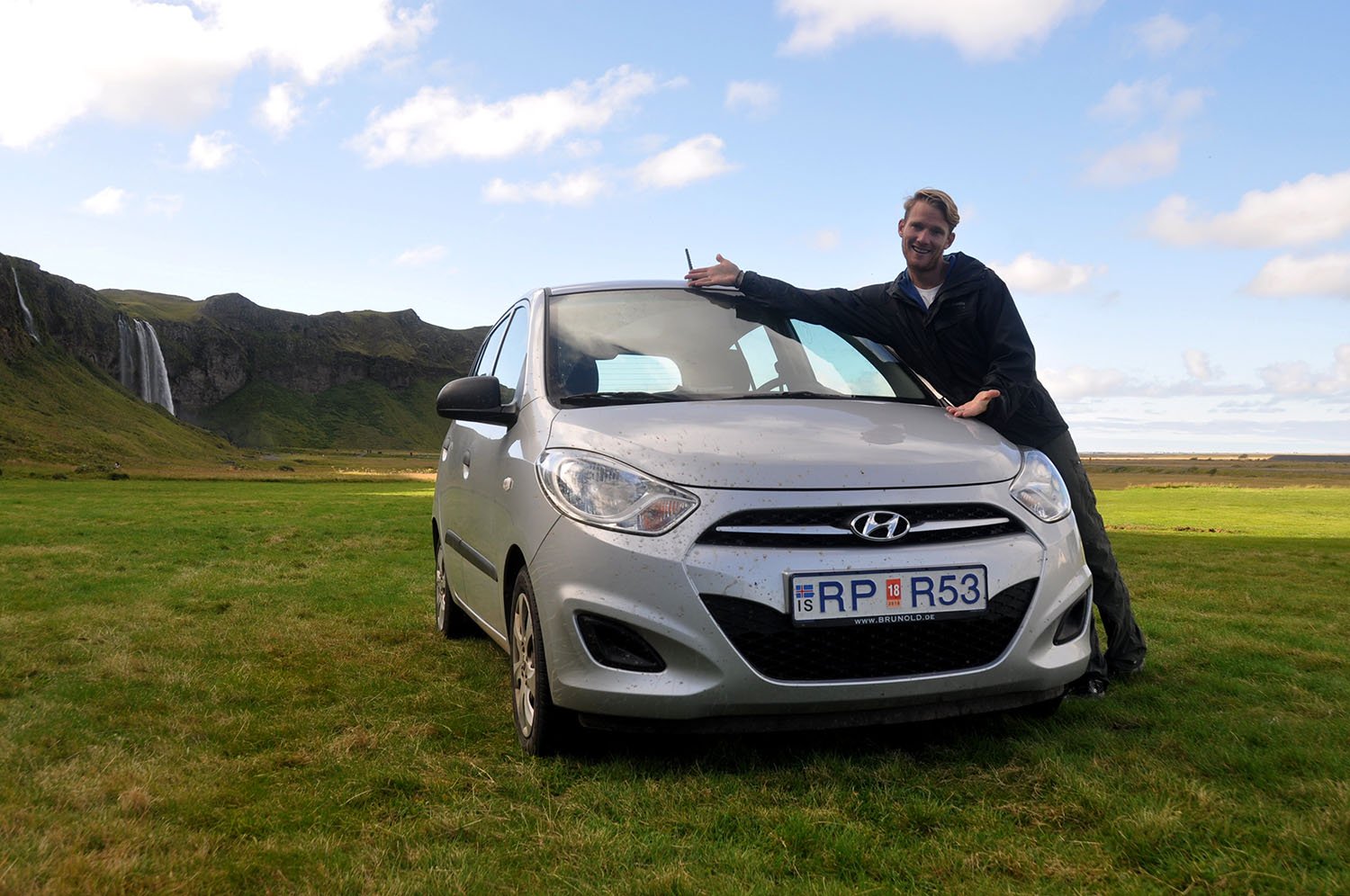
All cars must be imported to this island nation, which means there’s not a ton of vehicles just sitting around waiting for you to score a great last minute rental deal.
As tourism to Iceland has risen in the past decade, rental car companies are trying to keep up with the demand. However, during the busy times of year, there just straight up aren’t enough (good quality) vehicles for all the people who want to rent. If you wait until the last minute, not only are you not going to get a deal, but you won’t have much to choose from: Think an old clunker with manual transmission.
Quick story: A few weeks before our most recent trip to Iceland, we saw a bunch of people complaining on forums that rental car prices were more than $500 per day. PER DAY. That’s insanity. And they likely could have avoided those sky-high rates if they had booked their rental car earlier (sometimes easier said than done, we know!). Use this as a lesson as you start to plan your own trip.
As we mentioned above, one of the benefits of booking through Booking.com is the free cancellation policy (up to 48 hours before your trip!). So just go ahead and book it so you’re not outta luck…
Be sure you know if you’re renting manual or automatic
Many rental cars in Iceland are in fact manual transmission. If you feel comfortable driving a stick shift, you can actually save a bit of money on your rental! However, if you’re not familiar with manual transmission this is not the place to save money.
You might have to read the bullet points to figure out what type of vehicle you’re getting (it’s not always super clear), so be sure to take the extra 30 seconds to double-check what you’re reserving.
Take “before” photos of your rental
Before putting your keys in the ignition, be sure to walk around the car and take close up photos (or maybe even a video) of any nicks and scrapes you see. While the rental company we went through didn’t make too big of a deal about inspecting our car upon return, we’ve heard many people who have had the opposite experience.
Check to see if you have Mileage Restrictions
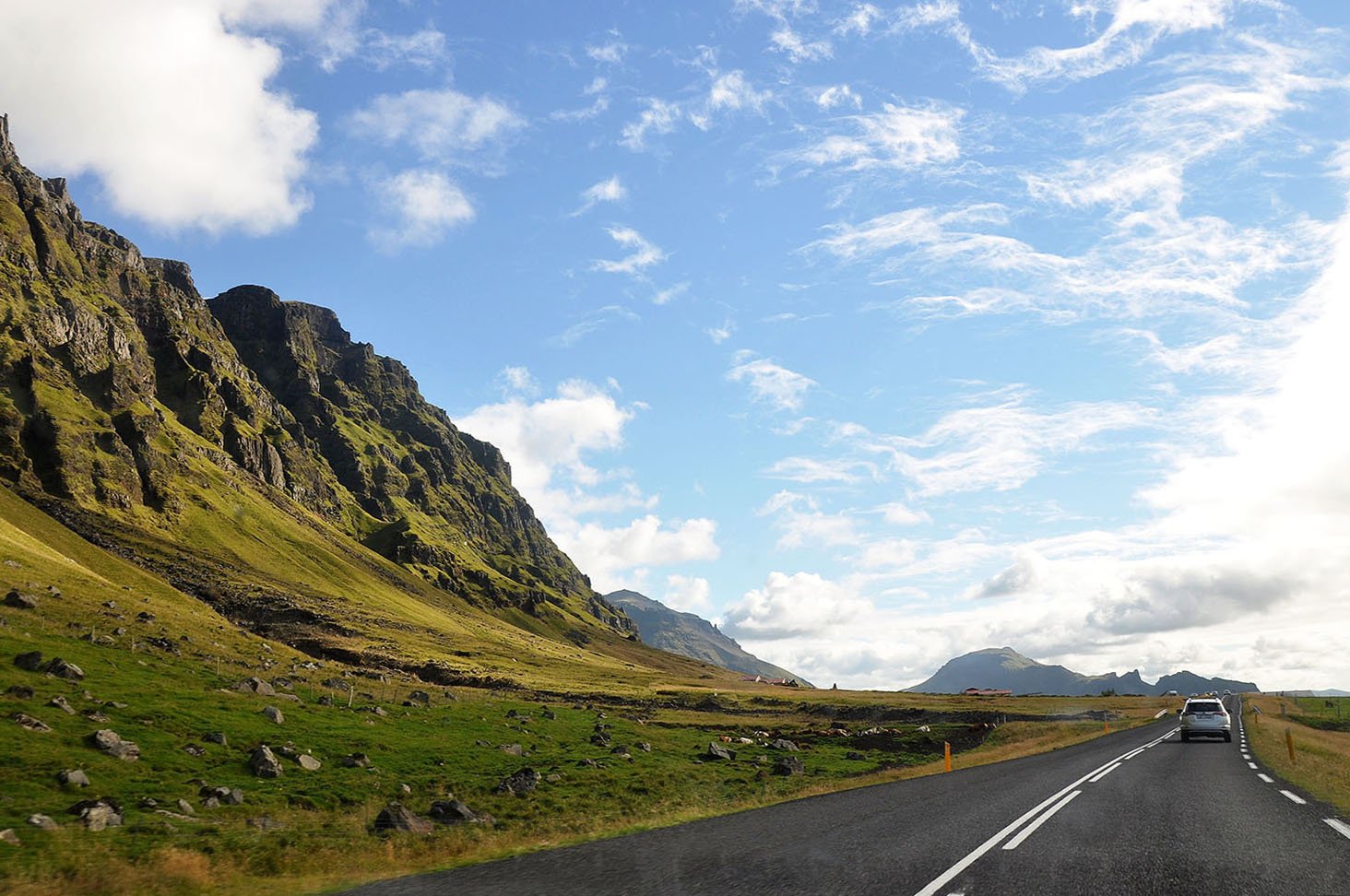
Depending on which rental company you go with, they might limit the number of miles you can drive each day. It will likely come at a cheaper rate than cars with unlimited mileage.
Personally, we wouldn’t want to be restricted by the number of miles we could go, so we always choose to opt for the unlimited mileage option. However, depending on your trip plans, you might not be inhibited by the restrictions.
Choosing a rental car in Iceland

There are many options when it comes to the type of car you will rent, and it depends on your specific needs.
Let’s go over some things to consider as you choose your rental car:
- Budget: Your overall budget will help determine the type of rental car you choose. Before selecting the absolute cheapest car out there, be sure to compare it to those that are just a bit more money as they might have some important features.
- Manual vs. Automatic Transmission: Automatic is more popular and get reserved first, but tends to cost about 10% more than manual. Be sure you know which you’re booking, as it’s not always super clear.
- Travel Route: Depending on where you’re planning to explore, you might need a 4×4 rental car. If you stick to Ring Road or Highway 1 you’ll be fine with a standard car, but if you want to go venturing off on F-roads, you will need a 4×4.
- Time of year: If you are traveling to Iceland during the winter months, you may want to consider renting a 4×4 vehicle as it may make you feel more comfortable in cold or snowy conditions. Additionally, you might want a slightly bigger car in the winter, not only for more and power, but because you’ll likely have more luggage (gotta pack those extra warm layers!).
- Group Size: You’ll want to not only consider the number of seats, but also the space for everyone’s luggage. You don’t want a suitcase on your lap for the whole trip, after all!
Do you need a 4×4?
Mayyyybe…? Alright, we’ll do a better job than that to answer your question. But let’s just say that it depends on your situation.
You’ll need to consider a few things:
a) Where will you be traveling?
If you’re just planning to get a rental car in Reykjavik and drive on the Ring Road, then it’s not necessary to get a 4WD vehicle. Not a bad idea, but definitely not essential.
However, if you plan to go to places like the Highlands, you will definitely, 100% NEED a 4×4 car rental. The F-roads that take you into the backcountry are only suitable for 4WD vehicles. In fact, you are forbidden to drive on them without a 4×4 vehicle, and any damages you incur won’t be covered by insurance.
Search on NorthBound.is to find the perfect 4×4 truck or campers for your travels in Iceland.
b) What is your budget?
If you have a super tight budget, this might be a limiting factor, as in Iceland 4×4 vehicles are typically a bit more expensive. But not by that much, usually only $10 to $20 more per day.
c) What time of year will you be in Iceland?
If you’re traveling in the winter, you might want to consider upgrading to a 4WD vehicle if you’re not all that comfortable with winter driving conditions. However, a 2WD car might be just fine if you’re a confident winter driver.
Our thoughts: You will still be able to see many of Iceland’s most epic sights without 4-Wheel-Drive. We had a 2WD car and fared just fine, so don’t debate too hard!
Should you rent a GPS?
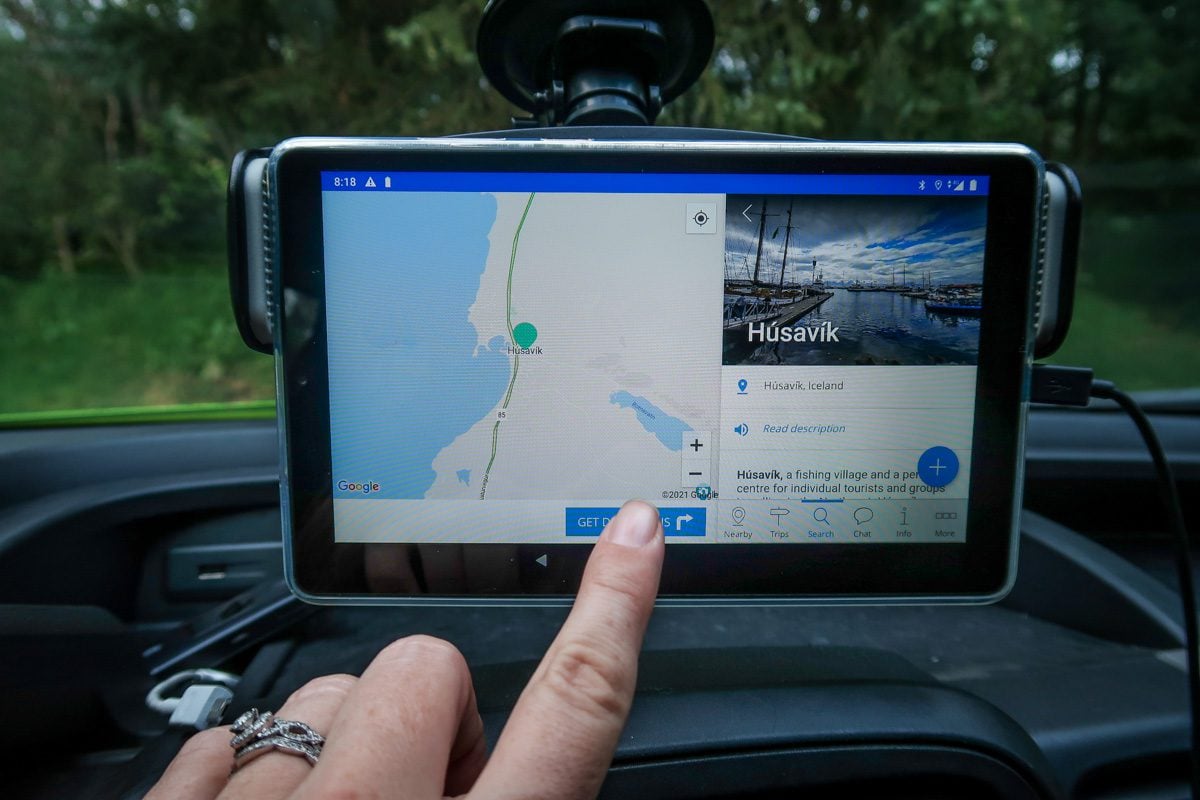
Most rental companies will offer the option of adding on a GPS. Depending on the cost, it might make sense to add it onto your rental.
We had a GPS device through our campervan company and it worked pretty well. Though I will say there were times where Google Maps on our phones gave us a more efficient route. The great thing about the GPS device that we had was that it also served as a hotspot, so we could connect our phones and laptops to it. Plus, it came with a live chat feature where we could get in contact with the staff at Happy Campers if we needed anything. Pretty nifty, huh?!
If you choose to forgo the GPS device and just go with your phone, here are a few tips:
- Pack a car mount like this one, so you can easily see the map while driving and can use your phone hands-free! (We like this one because it clips into the vent system, so you can easily take it in and out of a rental car and don’t have to worry about mounting it.) Our campervan came with a car mount but it didn’t fit our phones, so we were happy we brought our own.
- Get a local SIM card or a portable WiFi hotspot device. This will give you cell service and/or data so you can access your map and get directions along the way. In addition to our GPS, we rented a portable hotspot device (it was probably overkill to have both!), but it worked beautifully! Plus, we could take it on hikes with us so we’d have Internet access outside our van.
- Download the offline version of Google Maps before your trip. This means you will have access to the map even if you don’t have cell service. Yes, it will even show your up-to-date GPS location, as long as you have this feature enabled on your phone’s settings.
- Pack a battery charger for back-up. You wouldn’t want to end up stranded somewhere with a dead phone and no way to find your location. It’s easy to prevent this with a portable battery pack. We are partial to the Anker PowerCore 20100 because it can charge your phone 7 times before needing to be recharged itself.
Psst! Are you interested in hiking? We have a whole guide to the best hikes in Iceland with photos, details and insider tips to help you plan your trip.
Iceland Car Rental FAQs
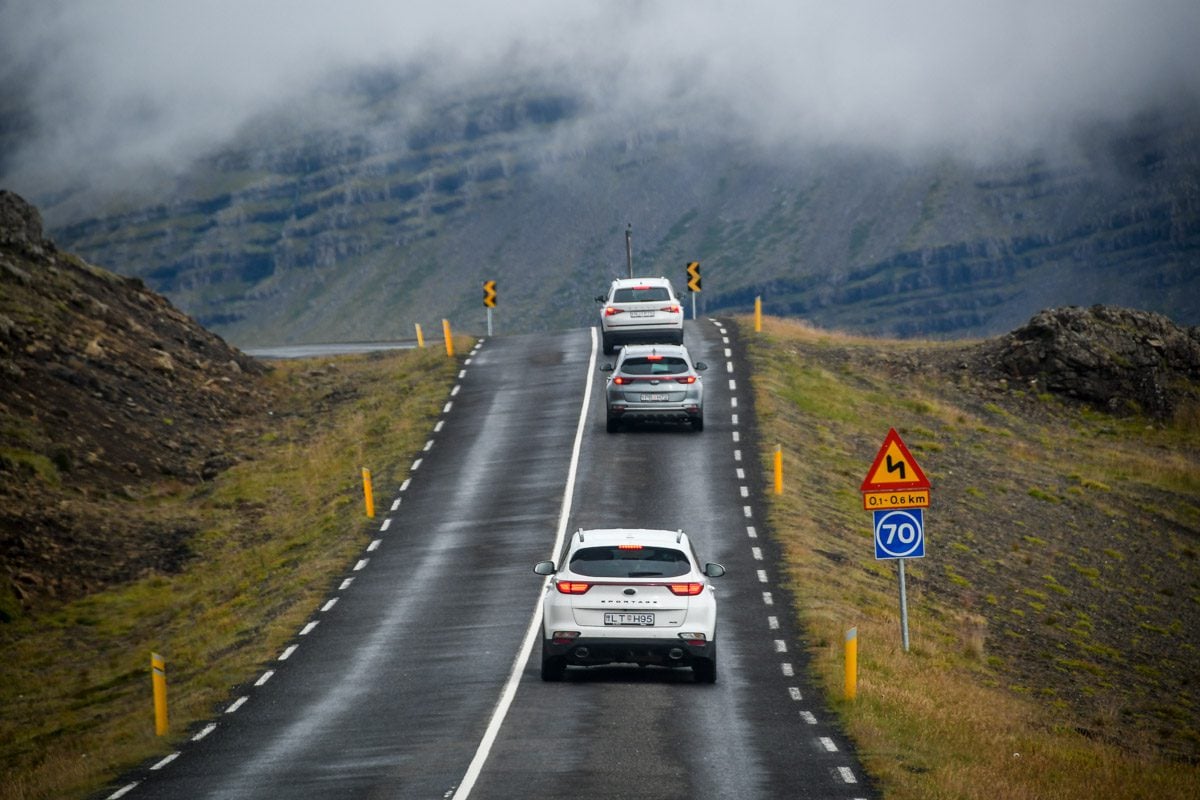
Still have questions about renting a car in Iceland? See if we’ve answered it below.
Do I need an international drivers license to rent a car in Iceland?
Most likely, you do not need an international drivers license to rent a car in Iceland. Simply bring your normal drivers license.
The exception is if you are from a country where your license is not in a Roman script (aka Japan or Russia, for example). In this case, you would need an international license, which basically serves as a translation.
What side of the road do they drive on in Iceland?
The right side. If you’re from the US or Canada, you’ll feel right at home. Until you realize there are no trees in sight and you’re surrounded by volcanoes…
What is the Iceland car rental age?
You must be 20 years old to rent a car in Iceland. We’ve read that the age is 23 years old to rent a 4×4 vehicle.
Additionally, if you are under 25, some car rental companies may charge what they call a “young driver fee”. You don’t need to think long and hard about why they do this…
Does it cost more to have more than one driver?
Short answer: It depends on the company you rent through.
Long answer: We tried several different companies listed on Booking.com as well as independent rental companies and found they differ quite a bit.
- One company didn’t charge anything no matter how many drivers.
- LagoonRentals charges 5 euro per extra driver each day.
- Other companies charged a one-time fee per extra driver, ranging from $22 USD to $30 USD.
If you plan to have multiple drivers, take this into consideration when choosing which rental company you go through.
Understanding rental car insurance in Iceland
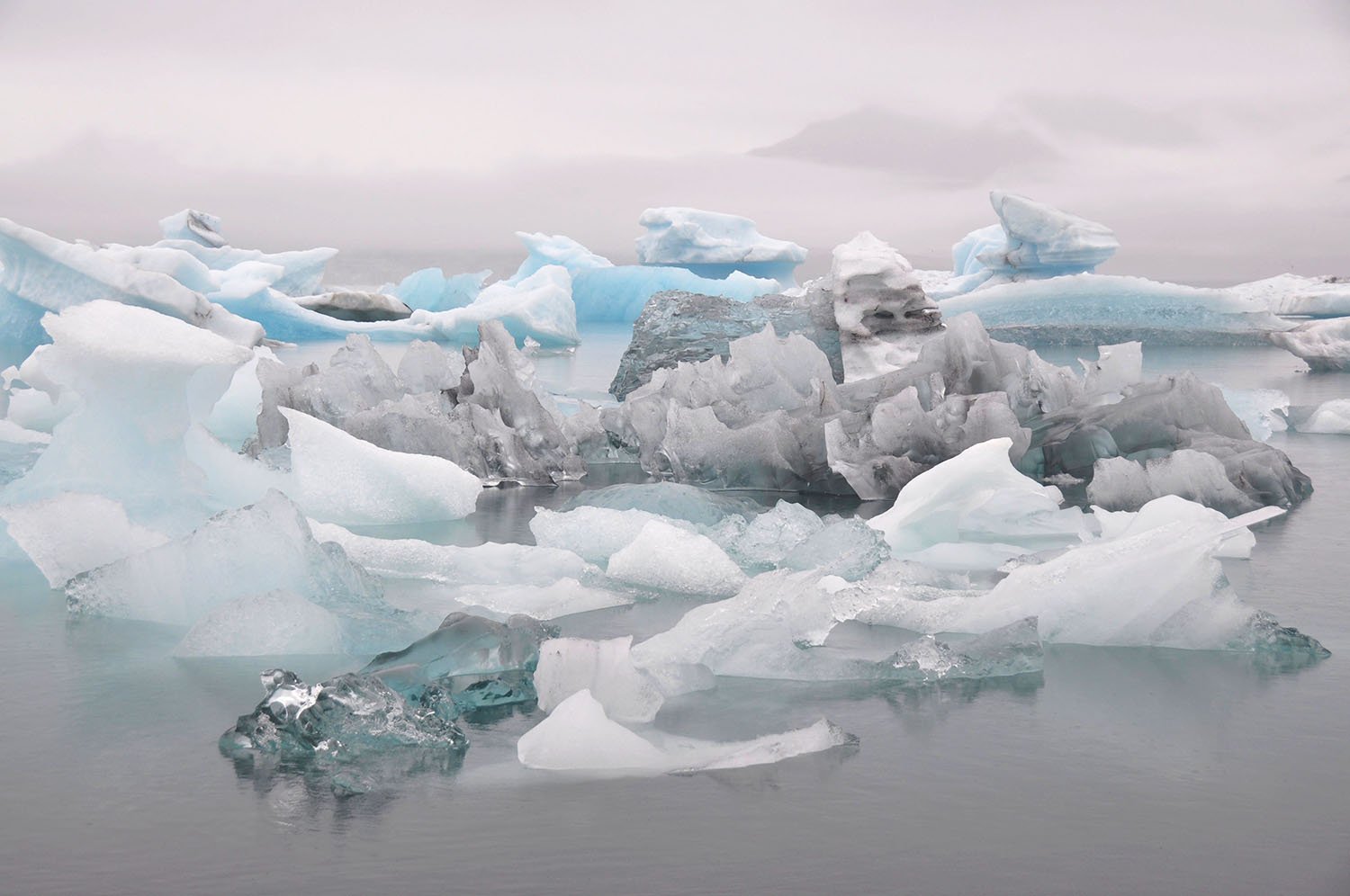
No matter where in the world you’re renting a car, you’re always going to have to make decisions about what type of coverage you’d like.
But in Iceland, it seems to be even more confusing than normal.
- CDW
- Super CDW
- Gravel
- Sand and Ash
Umm, what the heck does all that even mean?
Let’s break it down:
Collision/Damage Waiver (CDW)
Most rental car companies include this, but if you read closely it’s basically a wavier that you’ll pay the deductible if anything happens to the car. This can be anywhere from $1,500 to $3,000 if there is damage on the car. Be sure to read the fine print.
Super CDW (SCDW)
It’s a CDW that can fly and shoot laser beams from its eyes. Okay, maybe not, but it will decrease your deductible if you have any damage but you pay more per day. The deductible can decrease down to $250 but you have to pay around $10 per day.
Gravel Insurance
Coverage beyond the CDW and SCDW that is specifically for gravel and rocks hitting the car leaving dents. Prices for this coverage vary from company to company, but it can cost around $10 – $15 per day. This coverage should protect you in case your windshield gets damaged (unfortunately not uncommon in Iceland).
Our experience: Personally, we chose to get gravel insurance, as the cost of replacing a windshield is pretty expensive in Iceland. Our campervan rental company had the prices listed, and depending on the vehicle, this type of damage can cost you between $530 – $700. Yikes!
Sand and Ash Protection (SAAP) Insurance
This is coverage for if your car gets “sandblasted” in a wind storm, and not covered by SCDW or CDW. This really depends on the weather during your travels, which can sometimes be predicted. You can look at the forecast before you leave (sometimes even when you arrive) and decide if you want the coverage. If you’re really concerned about it, you can purchase this, but we personally opted out of this.
What about theft insurance?
While not impossible, the crime rate in Iceland is incredibly low. Like really, really low. It’s a small islands country, so people aren’t going to get very far with a stolen vehicle, after all. Plus, since you should always travel with travel insurance (like we do!) you will be covered for theft.
Important Note: Cross rivers at your own risk in Iceland, as this is not covered by insurance.
Iceland Car Rental Insurance FAQs
If you’re like us, you probably have some questions swimming around that head of yours. Let’s see if we can answer them…
“My credit card has rental car insurance, so I should be fine, right?”
You’ll have to read the fine print of your credit card agreement. Some policies make you decline all other forms of insurance while others only cover you as a secondary insurance.
Oftentimes, the coverage offered by credit cards is going to be on the more basic side and won’t cover things like windshield damage cause by gravel (which is super common in Iceland). Before opting to only go with this coverage, understand what is covered and what is not.
If you do decide with just the coverage on your credit card, make sure to pay for the rental hire in Iceland on that specific card.
“Will my travel insurance cover car rental damage?”
This will come down to your specific travel insurance policy. Be sure to read the fine print and really understand what type of coverage is included, if any.
For example, on one of our trips to Iceland, our policy covered minor damages, but on another trip to Iceland, our travel insurance had no coverage for rental cars. It varies a lot, so do some digging!
Good to know: Typically in order to be covered, the person on the travel insurance has to be the one on the rental agreement and the damage has to be reported within 24 hours of the incident. Our advice is to know the procedure before your trip so you can be prepared just in case something goes wrong (but fingers crossed you never need to use it!).
“I’m still confused… I just want to be covered.”
Iceland car rental insurance is complicated, we get it. We may have just the solution if you want pretty comprehensive coverage at a reasonable rate.
You can purchase a third-party insurance from a company called RoamRight. Select your state and the “Rental Car Coverage” in the drop down for the quote. It starts at $7.99 per day and allows you to decline other more costly coverages through the rental car companies.
Note: At this time, RoamRight’s coverage is only available to US citizens. Also, be sure to read the fine print to ensure your state is covered, as there are a couple of exceptions.
“What if I break down in Iceland?”
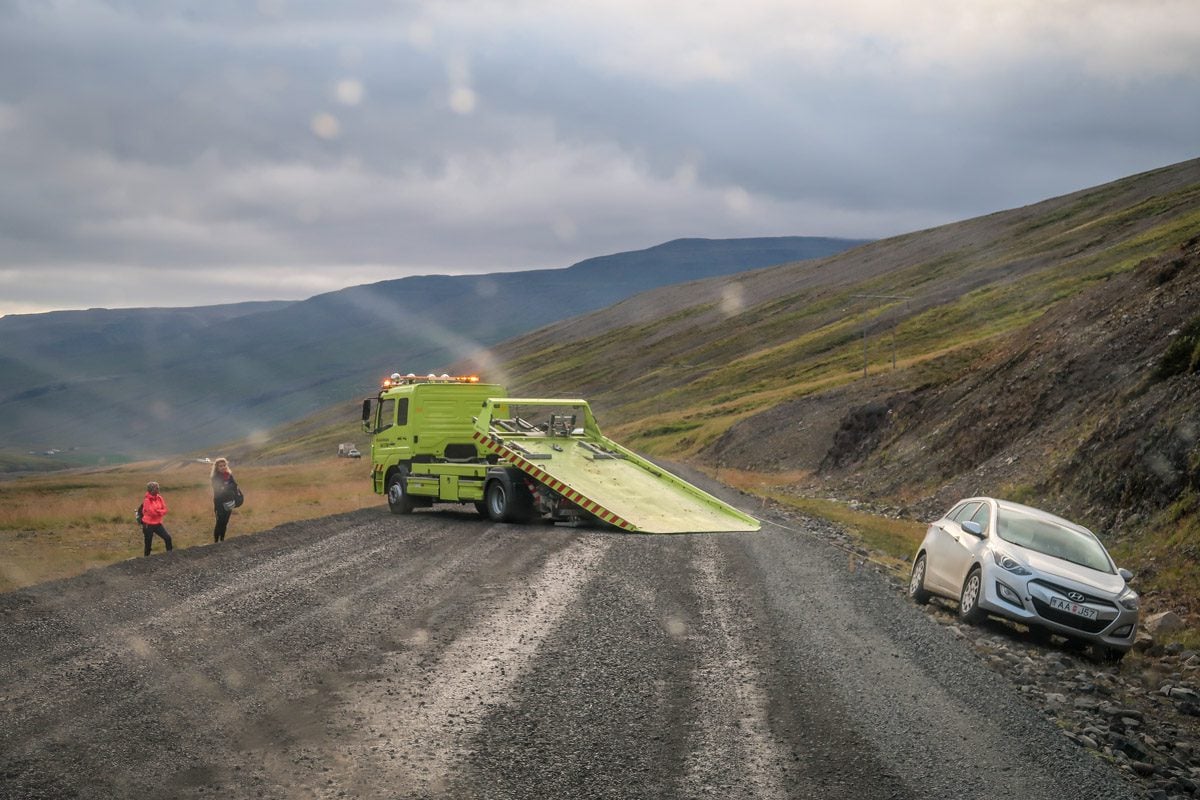
112 is the emergency number in Iceland and what you can call if you get in an accident.
112 is also one of the apps we recommend you download before your trip to Iceland as you can use it to send your GPS location in case of emergency. Fingers crossed you don’t have to use it, but it’s a good idea to have it ready to go in case you need it.
If you get a flat tire or your car won’t start, many rental providers include roadside assistance. Check to see if the company you’re going through offers this and whether or not it’s covered in your policy.
Campervan Rental vs. Car Rental
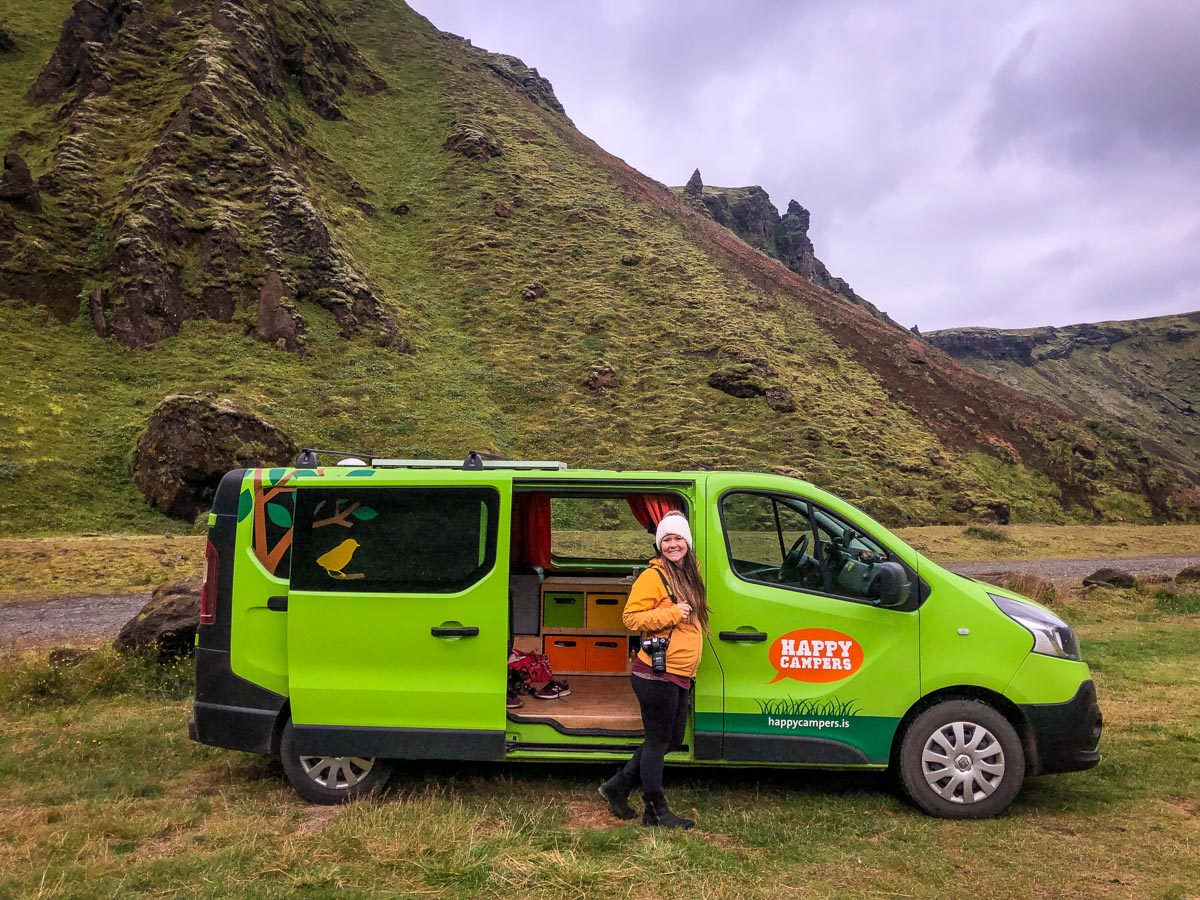
Rental Car or Campervan….? That is the question.
It’s no secret that we are obsessed with campervans. So it might be obvious what our answer to this question would be. However, when we traveled to Iceland, we rented a car and slept in a tent.
Why did we choose a rental car over a campervan? Well, there are 2 main reasons:
- We were on a SUPER tight budget. Iceland was our last stop on a yearlong round-the-world trip. And we were running out of money. The absolute cheapest way to travel in Iceland is by renting a car and tenting. So that’s what we did.
- We didn’t know how amazing campervans were. We didn’t build our own campervan until 9 months after our trip to Iceland. Had we known how awesome campervan travel is, we probably would have gone that route.
There are other reasons to choose a rental car over a campervan. Perhaps you just don’t like camping, which is fair. Staying in cute guesthouses or Airbnbs in Iceland might be a much more comfortable way to travel, especially if you have kids in tow.
You might prefer a campervan if…
a) You have a medium-sized budget to work with. Campervan rentals are around $110-$150 USD per day, which is more expensive than sleeping in a tent, but it can be cheaper than staying in hotels each night.
b) You’re seeking a grand adventure! Having a campervan allows you more freedom than traditional camping, as you can cook, eat and sleep all inside the comfort of your van. You don’t have to squat over a camp stove and boil your pasta noodles.
If you do decide to travel in a campervan, we recommend Happy Campers because they are a small, family-run local company with great service and van options.
Note: New legislation prohibits overnight parking outside of designated campsites, which if you think about it, is better for the natural environment of Iceland. Although it does limit your freedom of camping anywhere you want.
Read more about the differences between tent camping and renting a campervan in Iceland.
Perfect done-for-you Iceland itinerary
Want to skip the stress of trip planning?
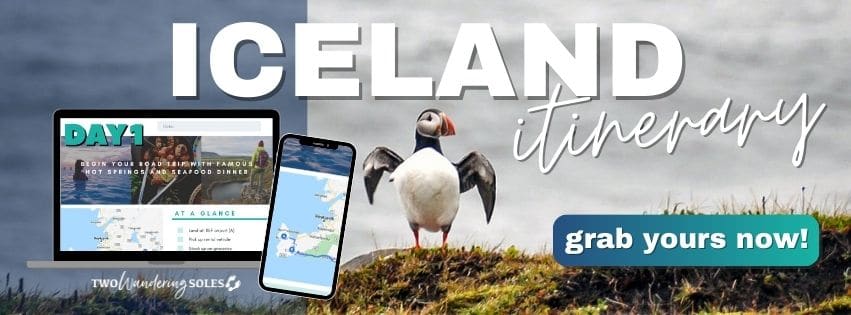
Planning a trip to Iceland can feel overwhelming—there’s so much to see, and it’s easy to miss hidden gems if you don’t know where to look. That’s why we created our done-for-you Iceland Southern Coast Itinerary—so you can spend less time researching and more time soaking in Iceland’s epic landscapes.
This 7–9 day itinerary takes you along Iceland’s breathtaking Southern Coast, blending adventure with a touch of luxury. You’ll visit iconic sights like Skogafoss and Diamond Beach, plus off-the-beaten-path spots most tourists miss (like a hidden waterfall that’s one of our all-time favorites!).
With detailed daily plans, insider tips, driving directions, and hand-picked stays, this guide takes the guesswork out of planning so you can experience Iceland stress-free.
Grab your itinerary here and start planning your dream trip!
Plan your trip to Iceland
We have TONS of resources on travel in Iceland and how to make the most out of your trip. Check out our Iceland Homepage for all the answers to your most burning questions, or read some of our favorite articles below.
- Check out all of our top recommendations for things to do in Iceland.
- Read up on Icelandic foods so you know what to try and what to skip.
- Get a complete cost breakdown for your Iceland trip and follow our sneaky budget tips to save money!
- Save this list of cool Iceland Airbnbs for when you’re ready to book your accommodation.
- And don’t forget camping in Iceland is one of the best ways to save money!
- You’ll want to keep this guide handy if you plan on driving Iceland’s Golden Circle.
- Read up on all the actually cool things to do in Reykjavik.
- Be sure to download these essential Iceland travel apps before your trip!
Don’t miss your chance to grab our Iceland packing list!
Click the banner to download our complete packing list for Iceland! It’s packed with good suggestions and insider tips to help plan your Iceland trip.
And it’s completely FREE, so why not!?
Save this article on Pinterest for later!
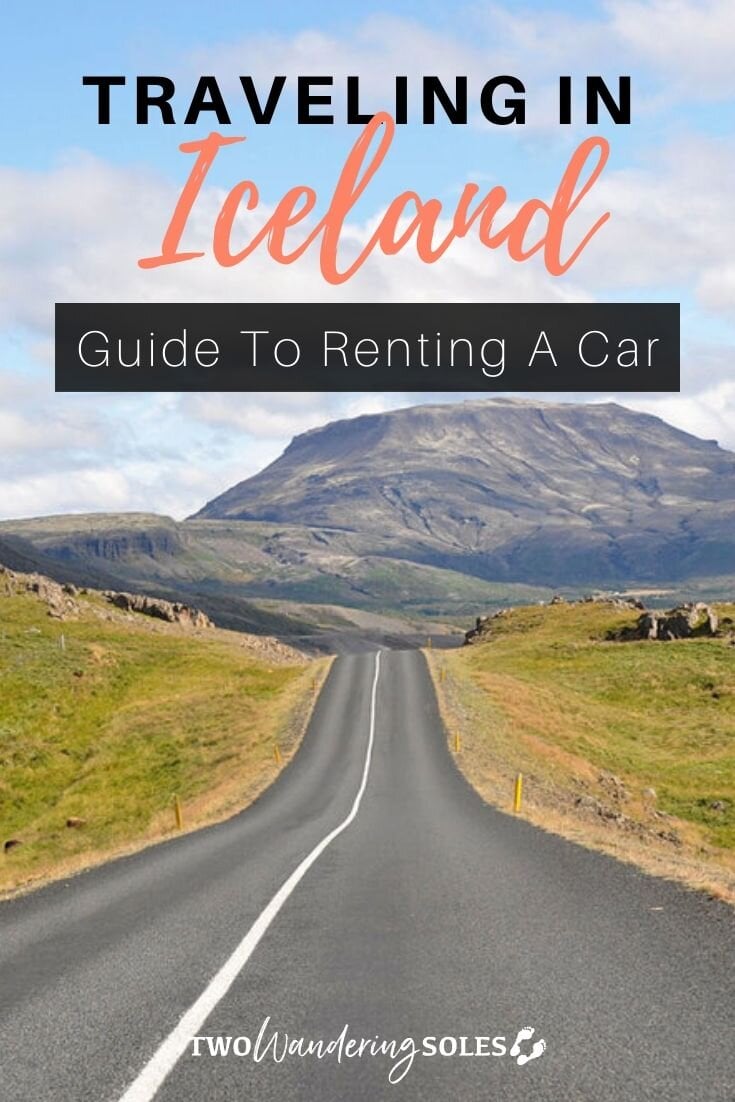
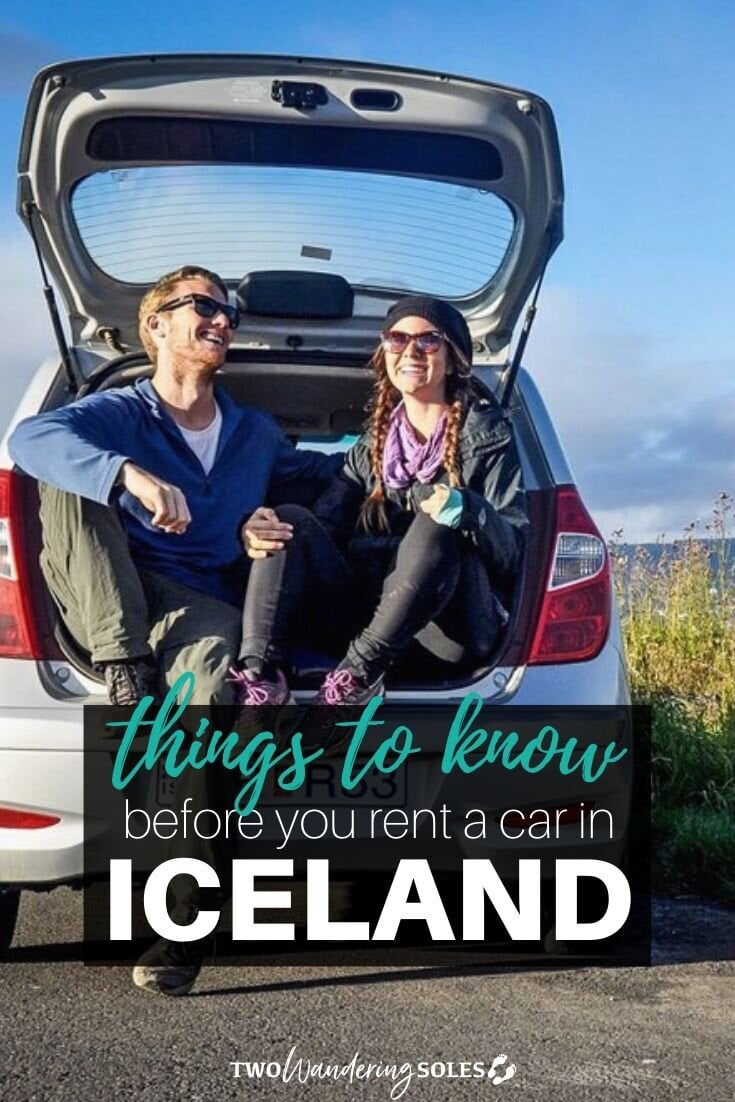
We want to hear from you!
Are you planning on renting a car in Iceland? Do you have any more questions we didn’t cover in this article? Please leave your comments and questions below and we’ll do our best to find you the answers you’re looking for.

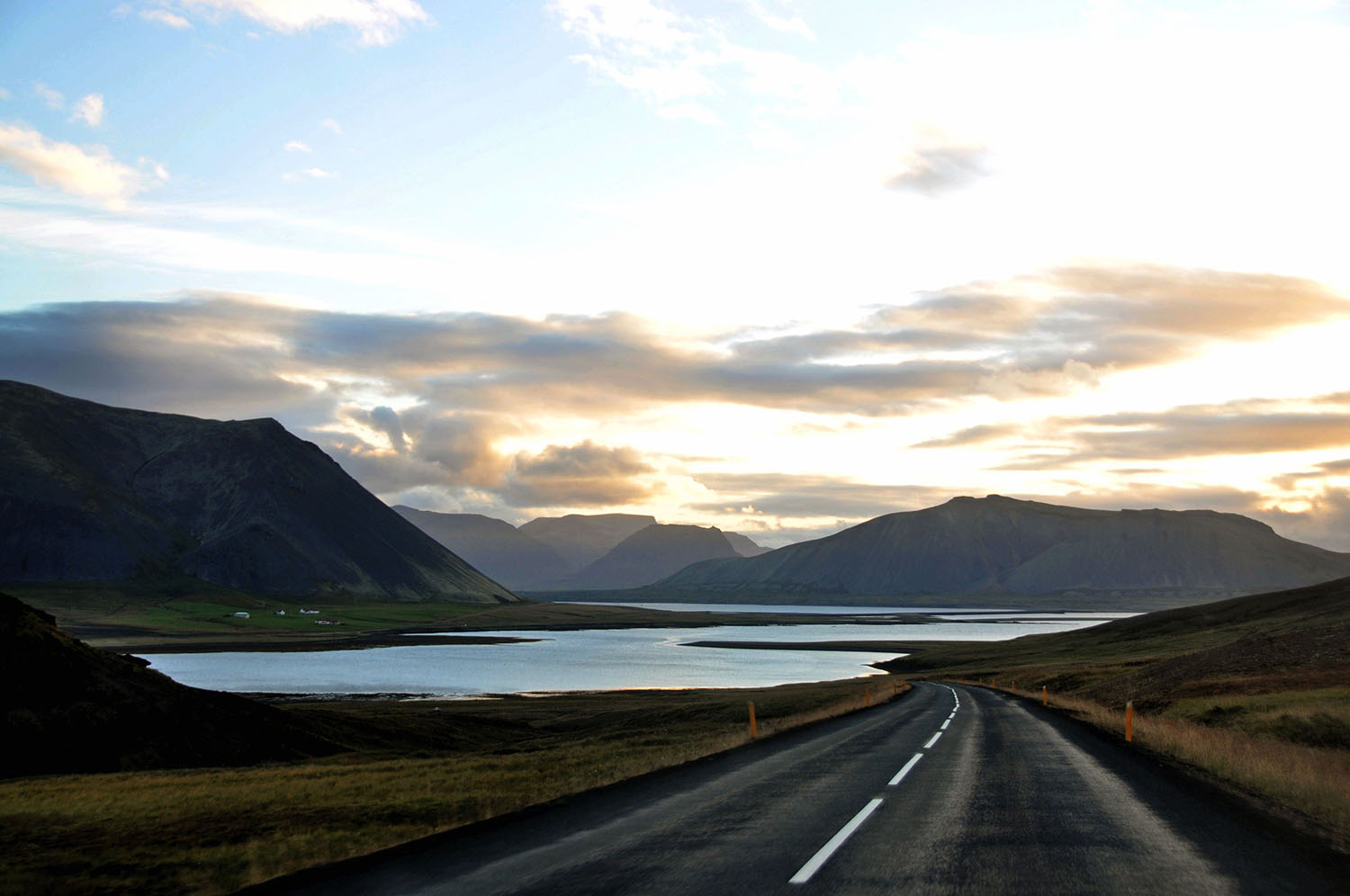
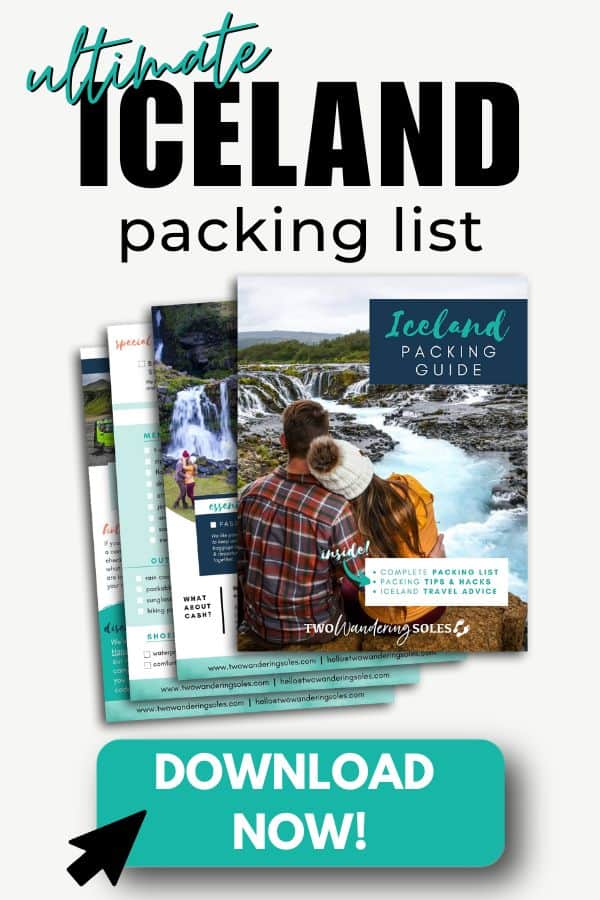
I am confused about rental car liability coverage. The 3rd party rental car carriers (Allianz for example) not offer it, nor is it covered with various credit cards (American Express) who offer rental car coverage as a benefit. I am a US resident. My US car insurance company doesn’t know if my US based policy with liability coverage extends to Iceland. Does anyone know if liability coverage is included in the rental car rate when renting a car in Iceland? I read that sometimes it is included in European Countries. Or, how do I obtain liability coverage? Thanks!
Hi, we are planning a trip to Iceland. I found good deal on travelocity.com but we are not very sure on the insurance they offer, because I an not an U.S. resident. Am I covered by their insurance? Or is best to avoid their insurance and get one over the counter at the time of pick up? Please let me know your opinion. Thanks.
Ace Car Rentals is amazing.. I did 10 days self drive about 4 years ago and they were the only company to offer Sand and Ash coverage as optional insurance, which I did take out. I also did a video car inspection before and after rental, making sure the car rental guy was with me.. I leave nothing to chance. I did get an optional gps unit through a camping rental place which was good until it lost service at Seydisfjordur and wanted me to turnaround back to Reykjavik… No thanks, I’ll just plow ahead. When using gas stations, never choose Full fill up.. as the Bowser automatically takes about $100 at a time.. even if you didn’t use that much, I ‘lost’ almost $400 in 3 days due to this, the unused is refunded back in a few days but it was terrifying and I had to get money transferred from Australia. I used prepaid petrol cards from then on. Sheep will wander Infront of your car.. frequently, drive 20 klms slower than speed limit!! As for the wind, never underestimate it.. saw for myself how a car door can buckle in about 2 seconds.
Thanks for your tips! They were helpful in planning the trip that we just returned from.
One update for you regarding paying for gas… Pretty much the entire country runs on mobile payments now, so we were able to use Apple Pay for everything, including the gas pumps, and if you do that, the pumps don’t ask for a PIN.
Also, I think all the rental companies include a "gas discount" in the form of a key fob with a gas company’s logo on it (although in our case, they never actually mentioned it when we picked up the vehicle). If you hold the fob up to the pump reader BEFORE you pay, you’ll get about a 8c discount per liter…that’s about 30c per gallon, which will add up over the course of a week+ trip around the country. Note the discount ONLY applies to the stations matching the logo on the fob!
Very informative! We have just read the section ‘Driving in Iceland’ and learned a lot. We are going through a ‘self-driving tour company’ and thus not renting on our own. Need to ask them about car insurance. Will definitely plan to read your other articles. Leaving for Iceland in a few days!
Thanks for your sharing! Must have a try! And I am expecting more from you, Explore a wide range from apartments, Find your dream apartment directly from the owner, find yours anywhere, anytime for free at Volgo Point.
Love this article! Thanks for all the tips! So if you purchase the insurance on RoamRight, you can decline the insurance with the car rental company and be covered for everything you detail above? Or is it more complicated than that?
Good tips, when we were in Iceland we took a risk and didn’t get extra insurance. We saved up, however, there was always fear 🙂
Good advice! Especially the internet connectivity tips, pin need-to-know number comment, and how much a speeding ticket costs. My question is what happens if there is an accident?
I am glad to read your post. I has found the other article who mentioned the cheapest car insurance but its not make me satisfy. You really help me so much for do my homework. Thank you. netpolis.nl
Cool Post. Its very happy to adventure with our family thanks for posting
N ice post keep sharing such a wonderful post
Really interesting, especially your photographs are make me to stay on this page in more time. Appreciated.
By
Comfort Carz
https://www.comfortcarz.com/
Extremely helpful post. Thank you for collating all this info for us.
Interesting and useful info. Thanks.
Wow this is a really exhaustive post on what to do onwhat not to do. How did you do with the speed cameras? Any mail when you got home?
I would love to go camping in iceland, and a combination of an 4×4 and a roof top tent seems like a great idea.